Dumb, Drunk, and Delegating: A Case Study in Mediocrity with Good Networking
Dumb, Drunk, and Delegating: A Case Study in Mediocrity with Good Networking
Table of Contents
- The Accidental Executive: Or, How I Stumbled My Way to the Top (Again)
- The Myth of Meritocracy: Why Hard Work is for Suckers (and Interns)
- Liquid Courage: The Art of Networking Over Cocktails (and Avoiding Awkward Conversations)
- Delegation: The Ultimate Productivity Hack (for Lazy Geniuses)
- Identifying the Talent Pool: Where to Find Smart People (Who Will Do Your Work)
- The Art of the Subtle Edict: How to Give Orders Without Sounding Like a Jerk
- Blame Game 101: Mastering the Art of Deflecting Responsibility
- The Power of the Pause: Or, How to Look Intelligent While Saying Absolutely Nothing
- The Corporate Uniform: Dressing for Success (Without Actually Trying)
- The Office Politician: Navigating the Treacherous Waters of Workplace Drama
- The Importance of Golf: Or, How I Learned to Stop Worrying and Love the Fairway
- The Illusion of Control: Why Micromanaging is for Amateurs (and Control Freaks)
- The Art of the Apology: Saying "Sorry" Without Actually Meaning It
- The Future of Work: Or, Why Robots Will Eventually Replace Us All (and I'll Be on a Yacht)
- The Ten Commandments of Delegation: A Foolproof Guide to Success (Maybe)
- Reflections on Mediocrity: Or, Why I'm Perfectly Content Being Average (ish)
Chapter 1: The Accidental Executive: Or, How I Stumbled My Way to the Top (Again)
Let's be frank, shall we? If you've picked up this literary endeavor expecting a tale of grit, determination, and the relentless pursuit of excellence, you've clearly misread the . I assure you, there will be no inspirational anecdotes about pulling oneself up by the bootstraps. Bootstraps, my dear reader, are for the peasantry. We, on the other hand, are more accustomed to having our shoes shined by someone else while we contemplate the finer points of a single malt scotch.
I am Reginald Bartholomew Finch III, and my journey to the upper echelons of the corporate world has been, shall we say, unconventional. Some might even call it accidental. But then again, isn’t most of life a series of fortunate accidents, skillfully disguised as strategic brilliance? I prefer to think so.
My ascent, if one can even dignify it with such a term, began, as many things do, with a monumental blunder. It was during a particularly tedious board meeting at Sterling-Prescott, the venerable (and might I add, increasingly obsolete) financial institution where I currently hold the rather nebulous of "Senior Vice President of Strategic Initiatives." The agenda, as always, was mind-numbingly dull: projections, KPIs, synergy, blah, blah, blah. My mind, quite frankly, was elsewhere. Specifically, it was envisioning the eighteenth hole at the Cypress Point Club and the rather impressive birdie I intended to sink later that week.
Now, for those unfamiliar with the intricate dance of corporate governance, board meetings are less about actual decision-making and more about maintaining the illusion of competence. Everyone nods sagely, makes vaguely intelligent noises, and pretends to understand the PowerPoint presentation, all while desperately trying to avoid eye contact with the CEO. I, however, have never been one for pretense. So, when the CFO, a particularly odious little man named Mr. Abernathy (no relation to the eager intern Bart, thankfully) droned on about "maximizing shareholder value through innovative synergistic paradigms," I may have… dozed off.
Not entirely, mind you. More of a strategic power nap, designed to conserve energy for more pressing matters. However, my slumber was interrupted by a particularly loud snort, which, regrettably, coincided with Mr. Abernathy's climactic pronouncement: “And therefore, I propose we liquidate our holdings in the emerging markets sector!”
In my semi-conscious state, I misheard “liquidate” as “liquor,” and, thinking I was responding to a request for refreshment, I blurted out, “Excellent idea, Abernathy! Double scotch, rocks, for everyone!”
The boardroom, as you can imagine, fell silent. Abernathy, his face a shade of crimson that would have made a tomato envious, sputtered indignantly. The CEO, Mr. Montgomery Sterling, a man whose brainpower is inversely proportional to the size of his trust fund, looked utterly bewildered.
Now, any sane person would have apologized profusely, offered some feeble excuse about jet lag or a particularly potent sleeping pill, and quietly faded into the background. But, as I have previously established, I am not sane. Instead, I seized the moment.
“Gentlemen,” I declared, rising to my feet with a flourish (slightly unsteady, admittedly, but a flourish nonetheless), “Mr. Abernathy, in his infinite wisdom, has proposed a toast! A toast to… strategic diversification through alcoholic beverages! A toast to… synergy-enhancing spirits!”
I then proceeded, in a voice that I can only describe as “boisterous,” to deliver an impromptu speech about the virtues of Scotch whisky as a lubricant for corporate collaboration. I regaled them with anecdotes (some true, some… embellished) about famous business deals that had been sealed over a shared bottle of Glenfiddich. I even quoted (or rather, misquoted) Winston Churchill on the importance of “a good stiff drink” in times of crisis.
The effect was… surprising. Instead of being reprimanded for my egregious breach of boardroom etiquette, I was met with a mixture of amusement and, dare I say, admiration. Mr. Sterling, his eyes twinkling with a mixture of Scotch-induced euphoria and genuine confusion, actually applauded.
The following week, I received a memo from HR congratulating me on my “innovative approach to corporate leadership” and informing me that I had been promoted to Senior Vice President of Strategic Initiatives. Apparently, my drunken ramblings had been interpreted as a brilliant (and somewhat unconventional) strategy for boosting morale and fostering a more collaborative work environment.
And that, my dear reader, is how I stumbled my way to the top. Again. It was a potent cocktail of luck, timing, and a remarkable ability to turn disaster into opportunity. I had managed to convince a room full of highly paid executives that my drunken outburst was, in fact, a stroke of strategic genius.
Now, I’m not suggesting that you should emulate my behavior. Quite the contrary. I am merely illustrating the point that success in the modern corporate landscape is often less about competence and more about perception. It’s about knowing how to play the game, how to network with the right people, and, perhaps most importantly, how to delegate the actual work to someone else. Preferably someone like young Bart Abernathy.
Which brings me to my next point: the myth of meritocracy. Prepare yourself, dear reader, for a harsh dose of reality. Because in the following chapter, I intend to dismantle the comforting illusion that hard work and talent are the keys to success.
As I prepare to delve into the unsettling truth, I can already hear Brenda McMillan, my long-suffering executive assistant, clearing her throat disapprovingly. She's probably adjusting her scarf, a subtle but effective way of expressing her disapproval. Brenda, bless her pragmatic heart, believes in hard work and dedication. She's a relic of a bygone era, a time when effort actually mattered. She's also invaluable in keeping me from accidentally setting the office on fire or inadvertently insulting a major client.
"Mr. Finch," I can almost hear her saying, "are you sure you want to publish this? It could be… controversial."
Controversial? My dear Brenda, controversy is my middle name. Well, technically, it's Bartholomew, but you get the point.
And besides, who are we kidding? The truth, as always, is far more interesting than the fiction.
So, brace yourselves, because next time, we're going to talk about why hard work is for suckers (and interns).

The Accidental Executive
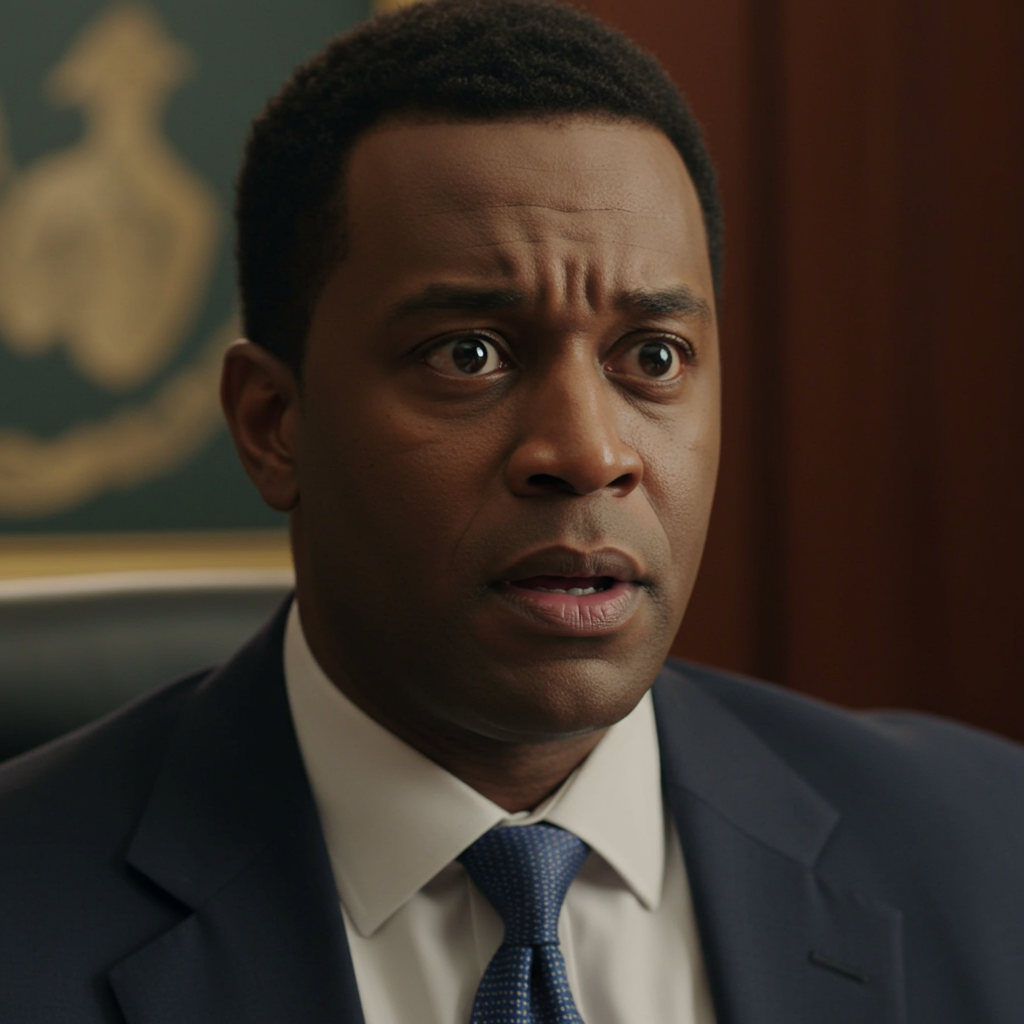
Boardroom Blunder
Chapter 2: The Myth of Meritocracy: Why Hard Work is for Suckers (and Interns)
Ah, meritocracy. That comforting little fable we tell ourselves to justify the yawning chasm between the penthouse and the pavement. A soothing balm applied to the conscience of the comfortably ensconced, assuring them that their gilded existence is the direct result of superior intellect, unwavering dedication, and an iron will. Poppycock, I say. Utter poppycock.
Let's be clear, the notion that hard work alone guarantees success is a charming, albeit naive, delusion peddled by those who have either never truly experienced the realities of the modern corporate landscape or, more likely, have conveniently forgotten the advantages they were born into. After all, it's far more palatable to attribute one's success to sheer grit and determination than to acknowledge the considerable leg-up provided by a trust fund the size of a small nation's GDP.
The truth, my dear reader, is far more nuanced, and, dare I say, far more cynical. Success, in the vast majority of cases, is less about inherent talent and relentless effort and more about a complex interplay of factors, including, but not limited to: inherited advantage, strategic networking, and, of course, a healthy dose of good old-fashioned luck.
Consider, for instance, the aforementioned Bart Abernathy, our eager intern. A bright young man, undoubtedly. Diligent, certainly. Possessing a work ethic that would shame a galley slave? Absolutely. But will Bart, with all his earnest endeavors and meticulously crafted spreadsheets, ever truly reach the dizzying heights of corporate power? I wouldn't wager my vintage Château Margaux on it.
Why, you ask? Because Bart, bless his cotton socks, is operating under the delusion that hard work is the key to unlocking the kingdom. He believes that if he puts in the hours, masters the skills, and consistently exceeds expectations, he will inevitably be rewarded with promotions, accolades, and a corner office with a panoramic view. He fails to grasp the fundamental truth: that in the game of corporate chess, pawns, no matter how diligent, rarely make it to the other side of the board.
The game, my friends, is rigged. Not in a malicious, conspiratorial sense, mind you. But rather in a subtle, insidious way that favors those who start with a significant head start. Those who possess the right connections, the right education, the right pedigree. Those who know the right people and can effortlessly navigate the labyrinthine corridors of power.
Take, for example, Montgomery Sterling, the CEO of Sterling-Prescott and a man whose business acumen is inversely proportional to the size of his yacht. Monty, a product of the same exclusive boarding schools and Ivy League institutions as myself, has never truly had to earn anything in his life. His position was practically preordained, a birthright bestowed upon him by virtue of his lineage and his membership in the right social circles.
Monty, I assure you, is not a particularly bright man. His understanding of financial markets extends to little more than recognizing the ticker symbols of companies his father used to invest in. But Monty possesses something far more valuable than intellect: he possesses access. Access to capital, access to influence, access to the very halls of power where the decisions that shape the global economy are made.
And access, my dear reader, is the ultimate trump card in the game of corporate success. It allows you to bypass the tedious requirements of hard work and meritocratic advancement. It allows you to leapfrog over your more talented and deserving colleagues and ascend to positions of power that you would never have attained on your own.
Now, before you accuse me of advocating for a system of blatant nepotism and cronyism, let me clarify. I am not suggesting that talent and hard work are entirely irrelevant. Of course, they play a role. But they are, in my estimation, vastly overrated. Far more important is the ability to identify talent in others and to effectively leverage it for your own benefit. This, my friends, is the essence of delegation, a topic we will delve into with considerably more enthusiasm in a subsequent chapter.
The astute reader might at this point be tempted to accuse me of hypocrisy. After all, am I not myself a beneficiary of the very system I am so gleefully dissecting? Am I not, in essence, a product of inherited privilege, coasting through life on the fumes of my family's fortune?
And to that, I say: guilty as charged. But I would also argue that I am uniquely qualified to comment on the absurdity of the meritocratic myth precisely because I have never had to rely on it. I have seen firsthand how the game is played, how the rules are bent, how the undeserving are elevated and the deserving are overlooked.
I have witnessed brilliant minds languish in obscurity while mediocre talents ascend to positions of power, simply because they possessed the right connections or the right social graces. I have seen hard work and dedication rewarded with nothing more than a pat on the back and a slightly larger bonus, while strategic inebriation and skillful delegation are rewarded with promotions and stock options.
The key, my friends, is to understand the rules of the game and to play them to your advantage. Don't waste your time toiling away in the trenches, hoping that someone will eventually recognize your brilliance. Instead, focus on cultivating relationships, building your network, and mastering the art of delegation.
Identify the talented individuals around you, the Barts of the world, and learn to leverage their skills and expertise for your own benefit. Offer them opportunities, provide them with guidance, and, of course, take credit for their accomplishments. It's a dog-eat-dog world, my friends, and those who hesitate are destined to become kibble.
And as for the myth of meritocracy? Let it be a comforting illusion for the masses, a carrot dangled before the noses of the relentlessly striving. We, on the other hand, know the truth. We know that success is not about hard work, it's about strategic maneuvering, skillful delegation, and, of course, a well-stocked liquor cabinet.
So, raise a glass, my dear reader, to the illusion of meritocracy. May it continue to lull the masses into a false sense of hope while we, the privileged few, continue to reap the rewards of our inherited advantages. And now, if you'll excuse me, I have a tee time to keep. Bart, fetch my clubs, would you? And make sure there's a double scotch waiting for me at the nineteenth hole.
But what happens when the Barts of the world begin to question the system? What happens when they realize that their hard work is being exploited and their talents are being used for the benefit of others? What happens when they start to demand their fair share of the pie? Tune in next time, when we explore the delicate art of employee retention (or, failing that, the subtle art of damage control).

The Myth of Meritocracy
Chapter 3: Liquid Courage: The Art of Networking Over Cocktails (and Avoiding Awkward Conversations)
Ah, networking. That essential, yet often excruciating, dance of forced pleasantries and thinly veiled self-promotion. A necessary evil, my dear reader, if one aspires to ascend the corporate ladder without actually, you know, doing anything of substance. While some misguided souls believe that genuine connection and mutual benefit are the cornerstones of a successful network, I assure you, a far more potent lubricant exists: alcohol.
Yes, liquid courage, that elixir of the socially inept, the balm for the awkward pause, the magic potion that transforms the dullest of conversationalists into veritable raconteurs (or at least, makes them think they are). The judicious application of alcohol can be the difference between a night of strained smiles and a career-defining connection. But tread carefully, my friends, for the path to networking nirvana is paved with the shattered reputations of those who imbibed too freely.
The modern cocktail party, you see, is a battlefield. A subtle, sophisticated battlefield, perhaps, but a battlefield nonetheless. Every handshake is a strategic maneuver, every shared anecdote a carefully crafted attempt to impress, every fleeting glance a calculated assessment of one’s social standing. To navigate this treacherous terrain, one must be armed with the right tools. A well-tailored suit, a firm (but not too firm) handshake, a ready supply of witty anecdotes, and, of course, a thorough understanding of the proper cocktail etiquette.
First, the beverage selection. Observe your surroundings. Are we at a stuffy, old-money affair, where the only acceptable drinks are single-malt scotch or a perfectly dry martini? Or are we slumming it with the “new money” crowd, where garish cocktails with names like "Electric Blue Lagoon" and "Flaming Volcano" are the order of the day? Adapt accordingly. Never, under any circumstances, order a drink that requires the bartender to exert himself excessively. Complicated cocktails are for amateurs. A simple, elegant drink conveys an air of sophistication and effortless control.
Second, the art of conversation. Remember, the goal is not to genuinely engage with your fellow attendees, but rather to leave them with a favorable impression of yourself. This requires a delicate balancing act. You must appear interested in what they have to say, while subtly steering the conversation towards your own accomplishments (or, more accurately, the accomplishments of those you have cleverly delegated to). A useful technique is to ask open-ended questions that allow them to ramble on about themselves, while you nod sagely and occasionally interject with a well-placed “fascinating” or “remarkable.”
Avoid controversial topics like politics or religion. Stick to safe, neutral ground, such as the weather, the local sports team, or the latest corporate scandal (but only if you can offer a suitably detached and cynical perspective). And for God's sake, never, ever, discuss your personal problems. Nobody wants to hear about your marital woes or your struggles with your golf swing. They are here to network, not to act as your therapist.
Bart Abernathy, bless his naive heart, learned this lesson the hard way at the Sterling-Prescott annual holiday soiree. Young Bart, eager to impress, cornered Montgomery Sterling himself and proceeded to regale him with a detailed account of his struggles to pay off his student loans. Monty, naturally, was less than enthralled. I overheard the tail end of the exchange as I was expertly navigating my way towards the canapé table.
"So, Mr. Sterling," Bart was saying, his voice cracking slightly with desperation, "with the rising interest rates and the… well, the general economic uncertainty, it's just… difficult, you know?"
Monty, who was attempting to balance a plate of miniature quiches while simultaneously fielding a call on his diamond-encrusted mobile phone, merely grunted in response.
"I was thinking," Bart continued, oblivious to Monty's disinterest, "perhaps Sterling-Prescott could offer some sort of… tuition reimbursement program? For interns, of course."
Monty finally lowered his phone and fixed Bart with a withering stare. "Young man," he said, his voice booming, "at Sterling-Prescott, we believe in rewarding hard work and dedication. Tuition reimbursement is for the weak. Now, if you'll excuse me, I believe those shrimp cocktails are calling my name."
Bart, predictably, was crushed. He retreated to a darkened corner of the ballroom, where he proceeded to drown his sorrows in a series of watered-down gin and tonics. He then committed the cardinal sin of complaining about his situation to Brenda, my ever-resourceful executive assistant, who, while sympathetic, could only offer him a weary smile and a gentle reminder that the corporate world is not for the faint of heart.
The moral of the story, my dear reader, is clear: never reveal your vulnerabilities. Always project an air of confidence and success, even if you are secretly drowning in debt and self-doubt. And above all, remember the power of liquid courage. A strategically timed cocktail can smooth over the rough edges, loosen the tongue, and create the illusion of genuine connection.
But be warned: the line between liquid courage and liquid disaster is a thin one. Know your limit. Nothing is more detrimental to your career prospects than making a drunken spectacle of yourself at a corporate event. Slurred speech, inappropriate advances, and unsolicited karaoke performances are all guaranteed to land you on the fast track to unemployment.
Therefore, mastering the art of pacing oneself is paramount. Sip slowly, alternate alcoholic beverages with water, and strategically position yourself near the hors d'oeuvres table to provide a convenient excuse to avoid prolonged conversations. And if all else fails, feign a sudden illness or a pressing engagement and make a hasty retreat.
Remember, the goal of networking is not to make friends, but to accumulate contacts. To build a Rolodex (or, more accurately, a LinkedIn profile) filled with individuals who can be leveraged for your own benefit. And while alcohol can be a useful tool in achieving this goal, it should be used with caution and precision.
So, go forth, my dear reader, and conquer the cocktail party circuit. Armed with your wit, your charm, and your newfound understanding of liquid courage, you are now well-equipped to navigate the treacherous waters of corporate networking. Just be sure to send me a postcard from the top. And perhaps a bottle of that Château Margaux.
As for Bart Abernathy, well, he's still struggling to pay off his student loans. But I have a feeling he's about to be presented with a… unique opportunity to improve his financial situation. More on that in the next chapter.

Liquid Courage
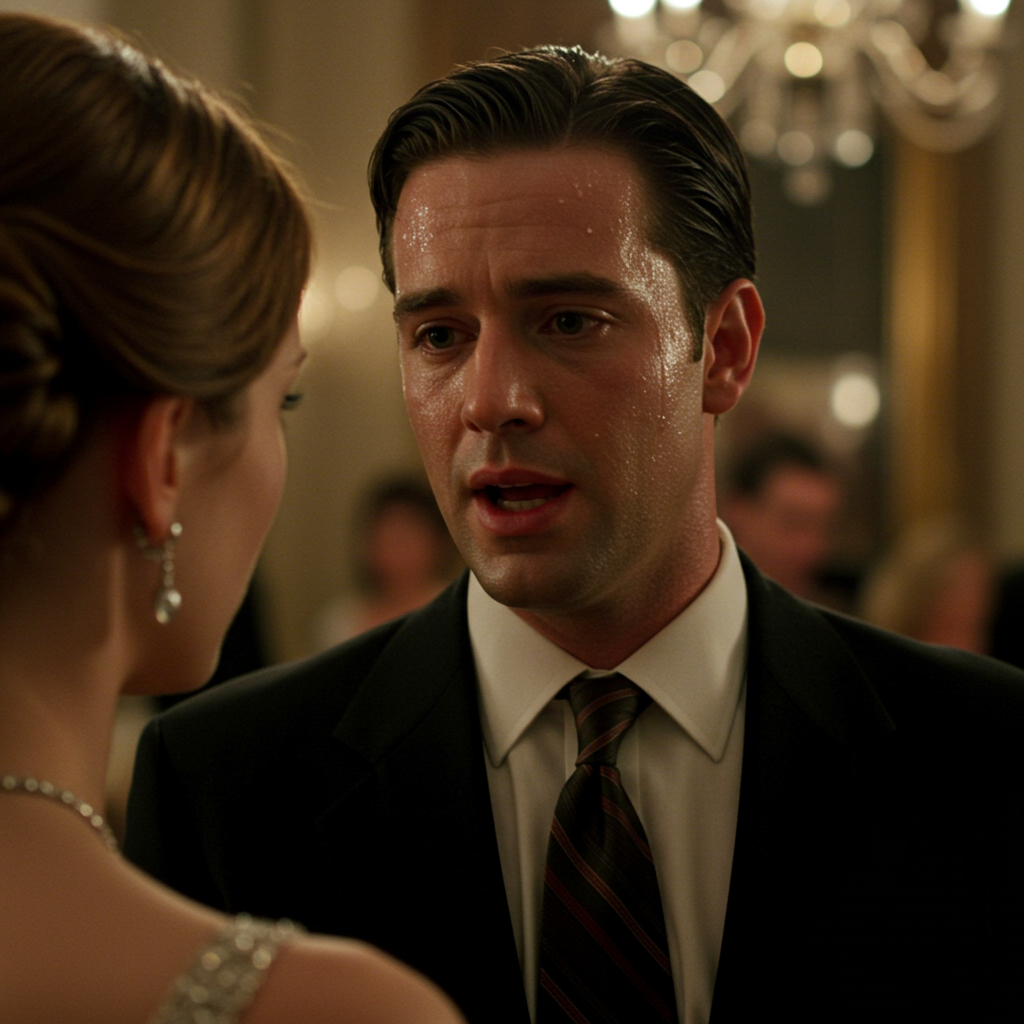
Networking Disaster
Chapter 4: Delegation: The Ultimate Productivity Hack (for Lazy Geniuses)
Right then, let's address the elephant in the boardroom, shall we? Or, more accurately, the lack of elephants in my boardroom, because I cleverly delegated the task of acquiring and maintaining exotic pachyderms to someone else. A chap named Higgins, I believe. Excellent fellow, Higgins. Always willing to go the extra mile, and rarely asks questions. A rare breed these days.
Delegation, my dear reader, is not merely a management technique. It is an art. Nay, it is a lifestyle. A philosophy. A sacred covenant between the intellectually superior and the… less intellectually endowed. It is the cornerstone upon which empires are built, fortunes are amassed, and afternoons are spent on the golf course, preferably with a decent single malt in hand.
Too many misguided souls equate delegation with laziness. They believe that true leaders must be constantly grinding, toiling away at every menial task, sacrificing their personal lives on the altar of productivity. Poppycock! Such behavior is not only unnecessary, it is frankly, inefficient. Why expend your own precious energy on tasks that can be performed equally well (or, let's be honest, adequately well) by someone else?
Think of it this way: you are the conductor of an orchestra. Your role is not to play every instrument yourself, but rather to guide and coordinate the efforts of the musicians. To ensure that each instrument is playing in harmony, creating a symphony of productivity. And, of course, to take all the credit when the audience applauds.
The beauty of delegation, you see, lies in its inherent efficiency. By entrusting tasks to others, you free up your own time to focus on more important matters. Strategic planning, for example. Or cultivating relationships with key stakeholders. Or perfecting your golf swing. The possibilities are endless!
Of course, effective delegation requires a certain level of… discernment. You can't simply foist tasks upon any Tom, Dick, or Harriet who happens to be loitering around the water cooler. You must carefully select individuals who possess the necessary skills, experience, and, most importantly, a willingness to do your bidding without complaint.
This is where the art of observation comes into play. Observe your subordinates. Note their strengths and weaknesses. Identify those who are eager to please, those who are reliable, and those who possess a certain… malleability. These are the individuals you want on your delegation dream team.
Bart Abernathy, my current intern, springs to mind. A bright, eager young man, albeit somewhat lacking in… initiative. He's a blank slate, a vessel waiting to be filled with my wisdom (and, of course, my workload). I've already tasked him with compiling a comprehensive report on the latest industry trends. A tedious, time-consuming task that would take me weeks to complete. Bart, however, will have it on my desk by Friday. Bless his cotton socks.
And let us not forget Brenda, my ever-resourceful executive assistant. A woman who could negotiate peace in the Middle East while simultaneously balancing my schedule and fending off unwanted advances from the sales team. Brenda is the glue that holds my professional life together. She anticipates my needs before I even realize them myself. She is, in essence, the ultimate delegation enabler.
But delegation is not simply about assigning tasks. It's about empowering others. It's about giving them the opportunity to grow and develop their skills. It's about fostering a culture of collaboration and teamwork. At least, that's what I tell myself when I'm feeling particularly philanthropic.
In reality, it's about minimizing my own effort and maximizing my own rewards. But let's not dwell on the cynical details.
The key to successful delegation, you see, is to provide clear and concise instructions. Don't leave anything to chance. Spell out exactly what you want, how you want it done, and when you want it delivered. And be sure to set clear expectations regarding quality and performance.
Of course, it's also important to provide adequate support and resources. Don't simply dump a task on someone's lap and expect them to figure it out on their own. Offer guidance, provide feedback, and be available to answer questions (within reason, of course).
And remember, a little bit of praise goes a long way. A simple "well done" or "excellent work" can boost morale and incentivize employees to perform at their best. Even if their "best" is merely adequate by your own exacting standards.
However, one must be prepared for the inevitable pitfalls of delegation. Things will go wrong. Mistakes will be made. Deadlines will be missed. This is simply a fact of life.
The key is to not panic. Don't lose your cool. And, above all, don't take responsibility.
Instead, find a scapegoat. Someone to blame for the mishap. Someone to take the fall. This is where the aforementioned "malleability" comes in handy. A well-chosen scapegoat will accept the blame without protest, preserving your own reputation and allowing you to move on unscathed.
Bart Abernathy, again, springs to mind. Should his industry report prove to be less than satisfactory, I have no doubt that he will readily accept full responsibility. After all, he's young, eager to please, and utterly lacking in the art of self-preservation.
"But Mr. Finch," he'll stammer, his voice trembling with anxiety, "I… I just didn't have enough time. And the resources were… limited. And the… well, the instructions weren't entirely clear."
To which I will respond, with a sigh of exasperation, "Bart, Bart, Bart. Excuses, excuses. In the corporate world, results are all that matter. Nobody cares about your excuses. Now, go back and fix it. And try not to disappoint me again."
Delegation, you see, is a delicate dance. A carefully choreographed performance of power and manipulation. It requires a certain level of cunning, a certain level of ruthlessness, and, of course, a healthy dose of liquid courage.
Which reminds me, I believe it's time for a martini. I have a feeling the Sterling-Prescott quarterly earnings report is going to require a significant amount of… strategic delegation. And perhaps a scapegoat or two.
Monty Sterling, bless his heart, called me earlier in the day to explain that the numbers were not looking good. He's clearly worried. I could hear the tremor in his voice, the faint whiff of desperation clinging to his words like cheap cologne.
"Reggie, old boy," he said, his voice strained, "we need to talk. The shareholders are getting restless. And the board… well, they're starting to ask questions."
"Questions, Monty?" I replied, my voice dripping with mock concern. "What sort of questions?"
"The sort of questions that could lead to… changes," he said ominously. "Changes that neither of us would particularly enjoy."
I chuckled. "Monty, my dear friend, you worry too much. I have a plan. A foolproof plan. A plan that involves a significant amount of… strategic delegation."
"And what, pray tell, does this plan entail?" he asked, his voice still laced with anxiety.
"Patience, Monty," I said. "Patience. All will be revealed. Over martinis. At the club. Seven o'clock sharp. And bring your checkbook."
The success of Sterling-Prescott hinges on my ability to delegate effectively (and to subtly extract funds from Monty's vast, yet easily accessible, fortune). And so, the dance begins. The delicate, cynical, and ultimately profitable dance of delegation.
Tomorrow, I shall outline the Ten Commandments of Delegation, a sacred text that will guide you on your own path to effortless success. But for now, I must attend to more pressing matters. Namely, the consumption of martinis and the strategic manipulation of Montgomery Sterling.
And perhaps, just perhaps, I'll delegate the task of writing the next chapter to Bart Abernathy. After all, he needs the experience. And I need the time to perfect my golf swing.
Until then, my dear reader, remember: work smarter, not harder. Delegate, delegate, delegate. And always, always, have a scapegoat ready and waiting in the wings.
But first... those martinis.
End of Chapter 4

Delegation: The Ultimate Productivity Hack

Lazy Genius
Chapter 5: Identifying the Talent Pool: Where to Find Smart People (Who Will Do Your Work)
Right then. Having established the undeniable virtues of delegation, we must now confront the rather pedestrian, yet undeniably crucial, question: where does one find these… willing participants in one's grand schemes? After all, a conductor cannot lead an orchestra if the musicians are all tone-deaf, or worse, actively hostile to the notion of playing in tune. Finding the right people to delegate to, my dear reader, is akin to sifting through a mountain of… well, let's just say it's akin to sifting through a mountain. A large, odiferous mountain. But fear not, for I, Reginald Bartholomew Finch III, shall illuminate the path to identifying those rare gems of competence hidden amongst the dross.
The first, and perhaps most obvious, place to begin your talent search is within the hallowed halls of your own corporation. After all, the company has already invested considerable resources in recruiting, vetting, and, dare I say, training these individuals. Why look further afield when perfectly serviceable candidates are already warming their seats at company expense?
However, one must approach this internal talent pool with a certain… detachment. Don't be swayed by appearances. Don't be fooled by impressive resumes or glowing performance reviews. These are merely superficial indicators, carefully crafted to deceive the untrained eye. What you're truly looking for are the telltale signs of… let's call it "pliable ambition."
Observe your colleagues. Who arrives early and stays late, not out of genuine dedication, mind you, but out of a desperate desire to impress? Who eagerly volunteers for extra assignments, even the most tedious and unrewarding ones? Who consistently seeks your approval, showering you with compliments and fawning over your every pronouncement? These, my dear reader, are your prime candidates.
Bart Abernathy, my aforementioned intern, is a perfect example. A bright, eager young man, brimming with naive enthusiasm and an unwavering belief in the power of hard work. He practically vibrates with the desire to please. A veritable sponge, ready to absorb any task, no matter how menial or time-consuming. He's also, bless his heart, remarkably oblivious to the subtle art of office politics, which makes him all the more… amenable to suggestion.
Of course, one must proceed with caution. Don't be too blatant in your exploitation. Remember, the key is to make them think they're gaining something from the arrangement. Offer them opportunities to "learn and grow," even if those opportunities primarily involve fetching your coffee and compiling spreadsheets. Praise their efforts, even if their efforts are merely adequate. And, above all, make them feel valued, even if their value is solely derived from their willingness to alleviate your workload.
Another fertile hunting ground for talent is the… slightly less reputable realm of freelance platforms and online job boards. While these platforms may be teeming with charlatans and self-proclaimed "gurus," they also offer access to a vast pool of skilled individuals who are willing to work for relatively modest fees.
The key here is to be ruthlessly discerning. Don't be swayed by flashy portfolios or eloquent cover letters. Focus instead on the tangible evidence of competence. Ask for samples of their work. Check their references (though bear in mind that references can be easily faked). And, most importantly, subject them to a rigorous screening process.
I, myself, have had considerable success in this arena. A chap named… let's call him "Mr. X," (for discretion's sake, you understand), once designed a rather ingenious marketing campaign for one of my… less successful ventures. Mr. X was located halfway across the globe, spoke limited English, and charged a pittance for his services. Yet, his campaign was a resounding success, generating a substantial increase in sales and earning me considerable accolades (which I, naturally, accepted with humble grace).
However, one must be aware of the potential pitfalls of outsourcing work to remote freelancers. Communication can be challenging, time zones can be inconvenient, and the quality of work can be… unpredictable. It's essential to establish clear expectations, provide detailed instructions, and closely monitor their progress. And, of course, to have a contingency plan in place in case they suddenly disappear with your money and your intellectual property.
Then, of course, there are the headhunters. Those sleek, well-groomed individuals who specialize in poaching talent from rival companies. While they can be undeniably effective in identifying and recruiting top-tier performers, they also come with a hefty price tag. And, frankly, I find their methods to be rather… uncouth. Like vultures circling a dying carcass, they swoop in to snatch away the best and brightest, leaving the rest to languish in mediocrity.
Besides, why pay a headhunter a fortune when you can simply… cultivate your own network of informants within those rival companies? A well-placed lunch, a discreet inquiry, a subtle hint of… future opportunities. These are the tools of the discerning talent scout.
Brenda, my executive assistant, is particularly adept at this. She has a remarkable ability to glean information from seemingly innocuous conversations, extracting valuable insights from the casual chatter of her peers. She knows who's unhappy in their current role, who's looking for a new challenge, and who's harboring secret ambitions. She is, in essence, my personal intelligence agency, providing me with a constant stream of valuable data on the talent landscape.
But perhaps the most overlooked, yet potentially rewarding, source of talent is… right under your nose. The individuals who are often dismissed as "unskilled" or "unqualified," the support staff, the administrative assistants, the junior employees who are relegated to the margins of the corporate world. These individuals often possess hidden talents and untapped potential, waiting to be discovered and nurtured.
I recall a particularly insightful conversation I had with a young woman who was working as a receptionist at one of my companies. She struck me as exceptionally bright and articulate, despite her… somewhat limited responsibilities. Intrigued, I engaged her in a more in-depth discussion, only to discover that she possessed a remarkable understanding of marketing principles and a knack for creative problem-solving.
I promptly promoted her to a more challenging role, where she quickly exceeded all expectations. She went on to become a valuable member of my team, contributing significantly to the success of several key projects. And all because I took the time to look beyond her job and recognize her hidden potential.
Of course, this approach requires a certain… open-mindedness. You must be willing to challenge your own assumptions and to see beyond the superficial indicators of competence. You must be willing to take a chance on individuals who may not fit the traditional mold. But the rewards, my dear reader, can be well worth the risk.
In conclusion, the key to identifying the talent pool is to adopt a multifaceted approach. Look within your own organization, scour freelance platforms, cultivate your network of informants, and, above all, be willing to recognize the hidden potential in those who are often overlooked.
And remember, the goal is not merely to find smart people, but to find smart people who are willing to do your work. Those who are eager to please, willing to go the extra mile, and, most importantly, content to remain in your shadow.
Now, if you'll excuse me, I have a luncheon appointment with a particularly promising candidate. A young man who, I suspect, possesses a remarkable talent for… managing my golf clubs.
But before I depart, a final thought. Once you’ve identified these bright sparks, how do you, shall we say, ‘motivate’ them to truly shine? Our next chapter will delve into the delicate art of incentivizing your talent pool, exploring the subtle dance of rewards, recognition, and, when necessary, the judicious application of… fear. Until then, keep your eyes peeled, and your delegation skills honed. The world is overflowing with potential, just waiting to be… utilized.

Identifying the Talent Pool

Exploitative Environment
Chapter 6: The Art of the Subtle Edict: How to Give Orders Without Sounding Like a Jerk
Right, then. Having successfully identified our… ahem… “talent pool,” as we so delicately phrased it in the previous chapter, we now arrive at the rather delicate matter of actually utilizing these individuals to their fullest potential. Or, more accurately, our fullest potential, which, as we’ve established, involves a minimal amount of actual… labor.
The key, my dear reader, lies in the art of the subtle edict. One does not simply order a subordinate to perform a task, like some vulgar, uncouth tyrant. No, no, no. Such blatant displays of authority are not only uncivilized but also remarkably ineffective. They breed resentment, stifle creativity, and, worst of all, result in shoddy workmanship. We, on the other hand, are masters of the nuance, the insinuation, the perfectly crafted suggestion that leaves the recipient feeling as though they have volunteered to perform the task in question.
It's a delicate dance, to be sure. A carefully choreographed ballet of manipulation and persuasion. One must be subtle, suggestive, and, above all, utterly convincing. Think of it as the art of suggestion, but applied to the workplace. You're not ordering anyone to do anything; you're merely… planting a seed. A seed of inspiration, a seed of motivation, a seed of… well, a seed of whatever gets the job done, really.
Take, for instance, Bart Abernathy, my aforementioned intern. A bright, eager young man, brimming with naive enthusiasm. A veritable sponge, ready to absorb any task, no matter how menial or time-consuming. Now, I wouldn’t dream of simply ordering Bart to, say, compile a comprehensive report on the quarterly earnings of our primary competitors. Such a crude approach would be beneath me.
Instead, I might saunter over to his desk, casually glance at his computer screen, and remark, "Bart, you know, I was just pondering the rather… intriguing performance of our competitors this quarter. It's quite the puzzle, wouldn't you agree? One wonders what factors might be contributing to their… unexpected success. A truly insightful analysis would be… invaluable."
And there you have it. The subtle edict in action. I haven’t explicitly told Bart to do anything. I’ve merely… expressed a passing interest in a particular topic, hinted at the potential value of a certain type of analysis, and allowed him to draw his own conclusions. And, bless his heart, he always does. Within hours, Bart is hunched over his computer, furiously crunching numbers and compiling spreadsheets, driven by the unwavering belief that he is making a valuable contribution to the company.
Of course, the subtle edict is not a one-size-fits-all approach. It requires a keen understanding of the individual in question, their motivations, and their insecurities. What works for Bart Abernathy might not work for, say, Brenda McMillan, my long-suffering executive assistant.
Brenda, bless her soul, is a far more… seasoned operative. She's seen it all, heard it all, and is no longer easily swayed by flattery or empty promises. With Brenda, one must adopt a slightly different approach. A more… direct approach, but still veiled in a carefully constructed veneer of courtesy and respect.
For example, if I needed Brenda to, say, reschedule a particularly tedious meeting with a particularly tiresome client, I wouldn’t simply tell her to do it. No, no, no. I might instead say, "Brenda, I'm terribly sorry to trouble you, but I seem to have inadvertently double-booked myself for that meeting with Mr. Henderson. A rather unfortunate oversight on my part, I must confess. I'm afraid I'll be completely tied up with a… critical… board meeting at that time. Is there any chance you could possibly… rearrange things on my behalf? I would be eternally grateful."
Notice the carefully chosen words. The apologies, the self-deprecation, the feigned helplessness. These are all essential components of the subtle edict, designed to disarm the recipient and make them more receptive to your request. And, of course, the subtle hint of desperation. Brenda, despite her cynicism, is not entirely immune to the plight of her hapless employer. She knows that I am utterly incapable of managing my own schedule, and she is, deep down, a decent human being. She will, begrudgingly, rearrange my schedule and spare me the agony of enduring Mr. Henderson's endless droning about the intricacies of his stamp collection.
The key, my dear reader, is to make the recipient feel as though they are doing you a favor, rather than simply following orders. This requires a certain degree of… theatricality. You must be willing to play the part of the bumbling, incompetent executive who is utterly dependent on the goodwill and competence of his subordinates. And, frankly, for some of us, that's not much of a stretch.
Another crucial element of the subtle edict is the art of delegation by… suggestion. Instead of explicitly assigning a task to a specific individual, you might simply mention it in passing during a team meeting, leaving it open for anyone to volunteer. This is particularly effective when dealing with competitive or ambitious individuals who are eager to prove their worth.
"You know," I might say, during a particularly tedious brainstorming session, "I was just thinking about the rather… pressing need for a comprehensive analysis of the latest market trends. A truly insightful report would be… immensely helpful in guiding our strategic decisions. Perhaps someone with a particular… aptitude for market research might be interested in taking on such a challenging assignment."
And then, I simply sit back and watch the feeding frenzy begin. Eager young executives, desperate to impress, vying for the opportunity to prove their worth. They practically trip over themselves to volunteer, each one more eager than the last to demonstrate their competence and dedication. And, I, of course, accept their offers with humble grace, allowing them to believe that they have somehow earned the privilege of doing my work for me.
Now, some might argue that this approach is… manipulative. That it involves deceiving and exploiting others for personal gain. And, to those individuals, I would simply say… you're absolutely right. But, as we’ve established, the pursuit of success is not always a morally upright endeavor. Sometimes, one must be willing to bend the rules, to push the boundaries, to… ahem… strategically leverage the talents of others to achieve one's goals.
The subtle edict, my dear reader, is not merely a management technique. It’s a philosophy. A way of life. It's the art of achieving maximum results with minimum effort. It's the secret to success in the modern corporate landscape.
And, speaking of success, I believe I’ll delegate the task of refilling my glass to Bart. After all, a dry martini is essential for strategic thinking… and, perhaps, for avoiding awkward conversations with the Chairman of the Board. Which, coincidentally, I seem to have inadvertently scheduled for tomorrow morning. A situation which may require a subtle edict or two of its own…
Right then. Now, if you'll excuse me, I have a pressing engagement with a bottle of single malt and a particularly comfortable armchair. The Chairman can wait. After all, what's a multi-million dollar business deal compared to the pursuit of personal tranquility? And, besides, I'm sure Brenda will handle it. She always does. Now, where did I leave that remote...?
(End of Chapter 6)
Hook to the next chapter:
But, alas, even the most carefully crafted subtle edict can backfire. And, as I was soon to discover, the Chairman of the Board is not always as easily manipulated as one might hope. A fact that would soon lead to a series of increasingly… uncomfortable… confrontations and a potential threat to my carefully constructed empire of delegation. Tune in next time, dear reader, for Chapter 7: "When the Edict Goes South: Damage Control for the Subtly Screwed."

The Art of the Subtle Edict
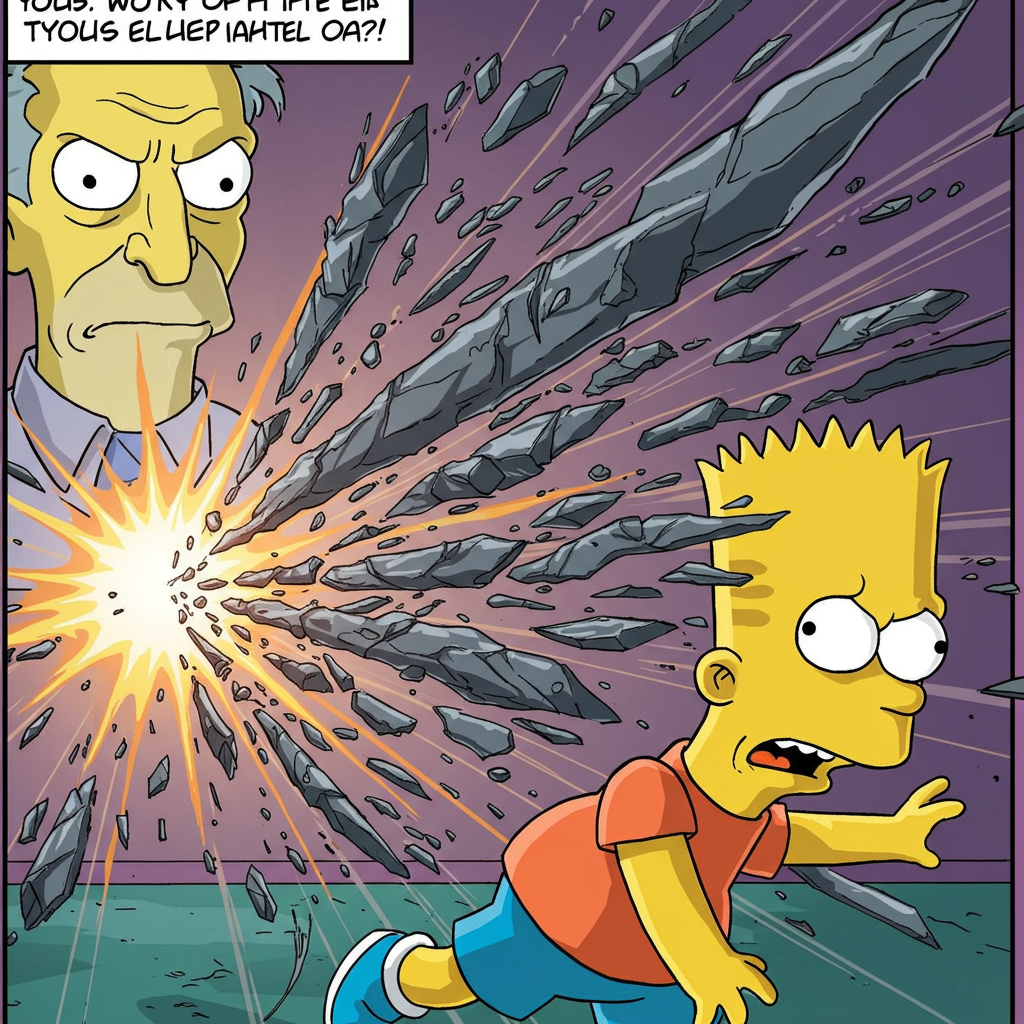
Jerk Alert
Chapter 7: Blame Game 101: Mastering the Art of Deflecting Responsibility
Right then, let's delve into a topic near and dear to my heart, and, if you’re being honest with yourself, yours as well. Blame. Glorious, shimmering, easily transferable blame. It is, my dear reader, the ultimate corporate lubricant, far more effective than any amount of liquid courage, and certainly less messy. After all, who needs to be responsible when one can simply… redirect?
The unfortunate truth, a truth conveniently ignored by those peddling saccharine tales of accountability and "owning your mistakes," is that things will go wrong. Projects will fail, deadlines will be missed, and profits will plummet. The key, my friends, is not to prevent these inevitable disasters (an impossible feat, I assure you), but rather to ensure that you are nowhere near the blast radius when the proverbial bomb detonates. This, my friends, is the art of deflection, the subtle yet powerful skill of redirecting culpability with the grace of a seasoned diplomat and the precision of a Swiss watch.
Now, some misguided souls might argue that taking responsibility is a sign of strength and integrity. Poppycock, I say! Such antiquated notions are best left to Boy Scouts and mid-level managers desperately clinging to their rapidly diminishing relevance. In the upper echelons of the corporate world, responsibility is a liability, a cumbersome weight that can drag you down faster than a poorly-timed stock option. No, my friends, the truly successful individual understands that responsibility is a hot potato, to be passed on with deftness and alacrity.
The first principle of Blame Game 101 is understanding your scapegoats. Every successful executive has a carefully curated collection of individuals perfectly suited to absorb the fallout of any potential disaster. We've already touched on the virtues of the eager intern, Bartholomew "Bart" Abernathy, a veritable sponge for absorbing responsibility, but he is merely one tool in the arsenal.
Consider, for instance, the indispensable Brenda McMillan, my long-suffering executive assistant. Brenda, while possessing a sharp wit and an even sharper intellect, is also burdened by an unfortunate sense of loyalty and a tendency to take ownership of problems. This, my dear reader, makes her an ideal candidate for the subtle art of deflection.
Let's say, for example, that a crucial report is delivered late to a key client, jeopardizing a multi-million dollar deal. Now, a lesser executive might panic, frantically searching for excuses and desperately trying to salvage the situation. I, on the other hand, would calmly summon Brenda to my office, feigning an expression of profound disappointment.
"Brenda," I would begin, my voice laced with carefully crafted concern, "I'm terribly disappointed to hear about the report. Mr. Henderson is quite… agitated. I understood this was a top priority. Was there perhaps… some miscommunication regarding the deadline? I distinctly recall emphasizing its urgency."
Note the subtle shift in responsibility. I'm not accusing Brenda directly, mind you. I'm merely expressing my disappointment and gently suggesting the possibility of a "miscommunication." This allows Brenda to fill in the blanks herself, to take ownership of the situation and to offer a plausible explanation for the delay.
"Well, Mr. Finch," Brenda might reply, her brow furrowed in concern, "I did relay the deadline to the relevant team, but perhaps I didn't emphasize the urgency sufficiently. I'll take full responsibility for that. I'll also reach out to Mr. Henderson immediately and offer our sincerest apologies."
And there you have it. A masterclass in deflection. Brenda has not only taken responsibility for the delay, but she has also offered to rectify the situation, effectively shielding me from any potential fallout. Of course, I will graciously accept her apology and offer a few words of encouragement, reinforcing her sense of loyalty and ensuring her continued willingness to absorb blame in the future.
But Brenda is not the only tool in my deflection arsenal. There is also the ever-reliable "systems error," a catch-all excuse that can be deployed in virtually any situation. After all, who can argue with a malfunctioning computer or a glitch in the software? It's an act of God, a force beyond our control, a convenient scapegoat that requires no further explanation.
Consider the scenario in which a particularly disastrous marketing campaign results in a significant drop in sales. Now, a less savvy executive might be tempted to blame the marketing team, publicly reprimanding them for their lack of creativity and their failure to understand the target audience. I, on the other hand, would take a more… nuanced approach.
"It appears," I would announce at the next board meeting, my voice resonating with gravitas, "that the recent marketing campaign has failed to achieve its intended objectives. However, I believe this is due to a temporary… ahem… 'systems error' within our data analytics platform. The algorithms, it seems, were not properly calibrated, resulting in a flawed understanding of consumer behavior."
Note the use of vague, technical jargon. "Algorithms," "data analytics," "calibration" – these are all buzzwords designed to obfuscate the truth and to create the impression of expertise. Most board members, I assure you, have no idea what these terms actually mean, but they are sufficiently impressed by the sheer volume of technical jargon to accept my explanation without question.
Of course, the "systems error" is entirely fictitious. The marketing campaign was simply ill-conceived and poorly executed. But by attributing the failure to a nebulous "systems error," I can deflect blame from myself and from the marketing team, avoiding any potential repercussions.
The key, my dear reader, is to be creative, to be adaptable, and to always have a plausible explanation at the ready. Blame is a precious commodity, not to be hoarded or wasted, but rather to be strategically deployed for maximum effect. And remember, the best defense is a good offense. When things go wrong, don't wait to be accused. Take the initiative, identify a suitable scapegoat, and deflect with the grace and precision of a seasoned professional. Your career, and your liver, will thank you for it.
And speaking of suitable scapegoats, I believe young Bart Abernathy has just stumbled upon a rather… interesting… discrepancy in the quarterly earnings report. He seems quite agitated, frantically adjusting his glasses and muttering something about "accounting irregularities." How… fortuitous.
Perhaps it's time for another masterclass in deflection. Or perhaps, just perhaps, it's time to introduce Bart to the concept of "creative accounting." After all, a little bit of financial wizardry never hurt anyone, right? Besides, who's going to believe a wide-eyed intern over a seasoned executive? The game, my friends, is afoot.
But before I summon young Abernathy, there is the small matter of a certain bottle of Macallan 25 that seems to have mysteriously vanished from my office. Brenda, I suspect, knows more than she's letting on. This, my dear reader, calls for a delicate blend of charm, intimidation, and perhaps a subtle threat or two. The Blame Game, as you are now beginning to understand, is a multifaceted endeavor, requiring a diverse range of skills and techniques. And the next chapter, I daresay, will be rather… explosive.

Blame Game 101
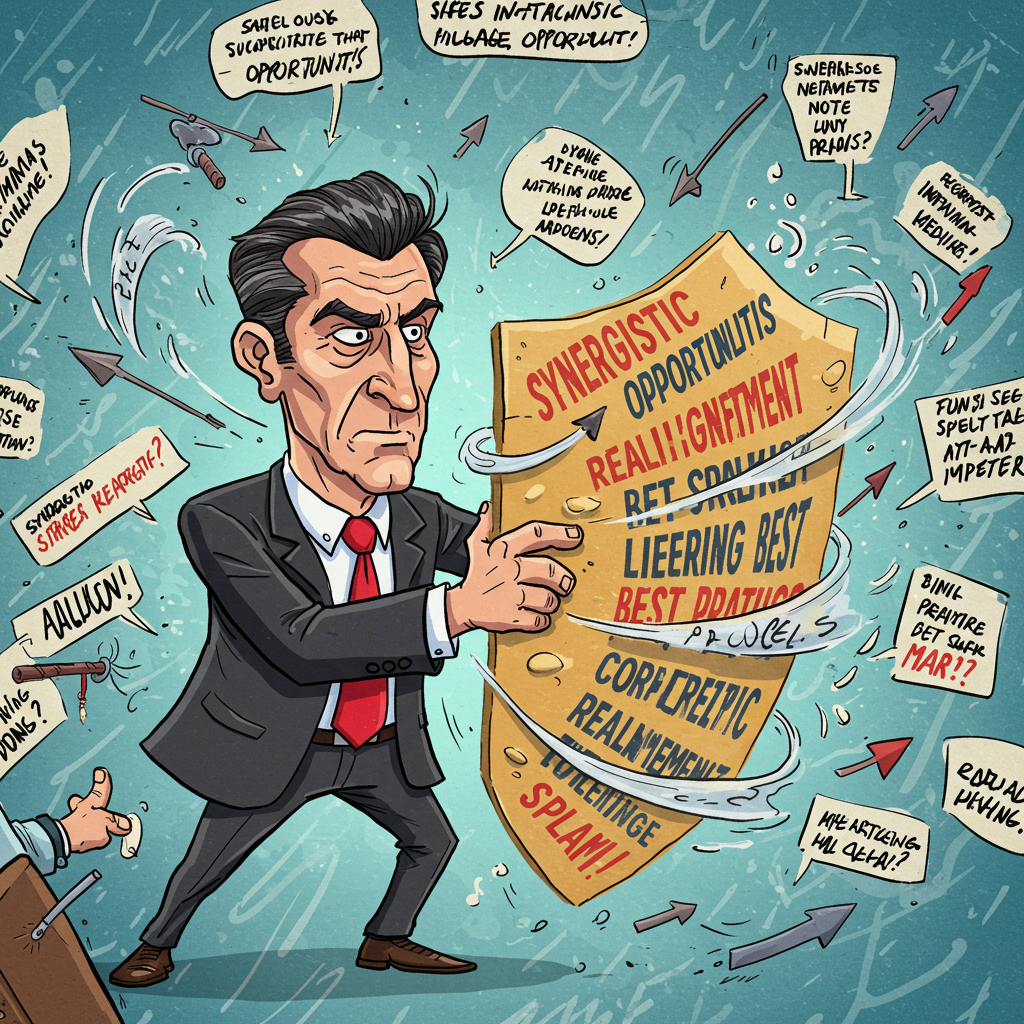
Deflecting Responsibility
Chapter 8: The Power of the Pause: Or, How to Look Intelligent While Saying Absolutely Nothing
Right then, let's discuss a skill so vital, so fundamentally crucial to navigating the treacherous waters of corporate life, that its absence practically guarantees a swift and ignominious descent into the lower ranks of middle management. I speak, of course, of the art of saying absolutely nothing with an air of profound intelligence.
Now, some of you, particularly those unburdened by the weight of inherited responsibility, might scoff at the notion that silence can be a virtue. You might cling to the outdated belief that knowledge is power, that contributing insightful commentary is the key to impressing your superiors. Poppycock, I say! Such naive assumptions are best left to the eager interns and the overachieving middle managers who haven't yet grasped the true nature of the game.
In the upper echelons of the corporate world, where the decisions are made and the fortunes are won (or, more often, inherited), the ability to remain silent, to observe without revealing, to project an aura of intellectual superiority without uttering a single coherent thought, is an invaluable asset. It is, my dear reader, the ultimate power move, a subtle form of dominance that can leave your rivals bewildered and your superiors utterly convinced of your brilliance.
The key, as with so many things in life, lies in the execution. One cannot simply lapse into silence and expect to be lauded for their profound insights. No, my friends, the art of the pause requires careful planning, meticulous preparation, and a healthy dose of theatrical flair.
First, and foremost, you must master the art of the contemplative gaze. This involves fixing your eyes on some distant point, preferably somewhere vaguely above the heads of your interlocutors, and maintaining a look of intense concentration. You must appear to be grappling with some profound and complex idea, wrestling with the very fabric of reality itself. The occasional furrowed brow and a slight pursing of the lips can add to the effect, conveying a sense of intellectual rigor and deep contemplation.
Of course, the duration of the pause is crucial. Too short, and you risk appearing uninterested or unprepared. Too long, and you might be mistaken for a particularly dense potted plant. The ideal pause should last for precisely the amount of time it takes for your audience to become subtly uncomfortable, to begin to question their own understanding of the topic at hand, to wonder if they have somehow missed a crucial piece of information. This is usually somewhere in the vicinity of seven to ten seconds, though it can vary depending on the context and the level of intellectual insecurity of your audience.
While maintaining the contemplative gaze, it is also essential to occasionally nod sagely, as if silently acknowledging the brilliance of your own internal monologue. A slight, almost imperceptible tilt of the head can also add to the effect, conveying a sense of nuanced understanding and subtle disagreement.
Now, some of you may be wondering, what happens when the pause inevitably comes to an end? What do you say after ten seconds of intense contemplation? The answer, my dear reader, is simple: you say absolutely nothing of substance.
The trick is to offer a vague, ambiguous statement that sounds profound but ultimately means nothing. Phrases like "That's certainly an interesting perspective," or "There are a number of factors to consider here," or "Let's not forget the importance of synergy" are all excellent choices. The key is to avoid committing to any specific position or offering any concrete suggestions. You want to appear knowledgeable and insightful without actually revealing any of your own thoughts or opinions.
Let me illustrate with a practical example. Imagine you are in a board meeting, discussing the latest marketing campaign, which, predictably, has been a complete and utter disaster. The marketing team, led by the hapless young Abernathy, is desperately trying to explain why their carefully crafted message failed to resonate with the target audience.
Now, a lesser executive might jump in with a barrage of criticisms, pointing out the flaws in the campaign and offering suggestions for improvement. This, my friends, is a fatal mistake. By revealing your thoughts and opinions, you are exposing yourself to potential criticism and opening yourself up to the possibility of being wrong.
I, on the other hand, would employ the power of the pause. I would fix my gaze on some distant point, preferably somewhere near the chandelier, and maintain a look of intense concentration. I would nod sagely, occasionally furrowing my brow and pursing my lips. After a carefully calculated ten seconds, I would offer the following gem of wisdom:
"It's clear that we need to re-evaluate our strategic approach and ensure that we are fully aligned with the evolving needs of the consumer."
Now, what does that even mean? Absolutely nothing. But it sounds impressive, doesn't it? It conveys a sense of strategic thinking and a deep understanding of the market, without actually committing to any specific course of action.
And that, my friends, is the beauty of the pause. It allows you to appear intelligent and insightful without actually having to be either. It allows you to navigate the treacherous waters of corporate life with grace and aplomb, avoiding the pitfalls of responsibility and the embarrassment of being wrong.
Of course, the art of the pause is not without its risks. One must be careful not to overuse it, lest one be mistaken for a coma patient. One must also be prepared to occasionally offer a more substantive contribution, particularly when one's own position or reputation is at stake.
But, in general, the power of the pause should not be underestimated. It is a valuable tool in the arsenal of any aspiring executive, a subtle yet powerful weapon that can be used to manipulate perceptions and to advance one's own career.
Indeed, just the other day, I found myself in a rather sticky situation at the club. Monty Sterling, bless his cotton socks, had gotten himself into a rather heated debate with a fellow member about the merits of a particular vintage of Bordeaux. Now, Monty, while possessing a certain… enthusiasm for the grape, is not exactly known for his nuanced understanding of oenology. He was quickly being outmaneuvered by his opponent, a smug and pretentious wine snob with a vocabulary that would make a sommelier blush.
Seeing my dear friend in distress, I knew I had to intervene. But what could I say? I knew even less about wine than Monty, which is saying something. So, I employed the power of the pause. I fixed my gaze on the bottle of Bordeaux, swirling the contents thoughtfully in my glass. I nodded sagely, occasionally sniffing the aroma with an air of profound expertise. After a carefully calculated fifteen seconds (a particularly bold move, I must admit), I declared:
"It's a wine of its time, reflecting the unique terroir and climatic conditions of that particular vintage."
The wine snob, momentarily stunned by my seemingly profound insight, was rendered speechless. Monty, however, beamed with pride, clapping me on the back and declaring me a veritable connoisseur.
And that, my dear reader, is the power of the pause. It can turn even the most clueless buffoon into a respected authority, at least for the duration of a well-timed silence.
Now, I must confess, I am growing rather weary of dispensing these pearls of wisdom. The exertion of appearing intellectually superior is, frankly, exhausting. But before I retire to my study for a well-deserved glass of scotch, let me leave you with one final piece of advice:
Practice the pause. Incorporate it into your daily interactions. Observe the reactions of your colleagues. Refine your technique. And, most importantly, remember that the key to success is not necessarily what you say, but how you say absolutely nothing.
Speaking of saying nothing, I've just received a rather cryptic message from Brenda. Something about Abernathy and a… "spreadsheet error." It seems our eager intern may have inadvertently stumbled upon some… sensitive information. Until next time, then, when we shall delve into the delicate art of damage control.

The Power of the Pause

Saying Nothing Intelligently
Chapter 9: The Corporate Uniform: Dressing for Success (Without Actually Trying)
Right then, let's address the sartorial elephant in the room, shall we? Or, perhaps more accurately, the lack of sartorial flair in the room, because, let's be honest, the modern corporate landscape is a veritable wasteland of ill-fitting suits, polyester blends, and ties that scream "mid-level management crisis."
The modern workplace, you see, is a battlefield. And on this battlefield, one must be properly… attired. Now, I'm not suggesting you go full peacock, mind you. Flashy displays of wealth are gauche, darling, and tend to attract the wrong kind of attention – namely, the sort that involves accusations of misappropriated funds and a lengthy investigation by the ethics committee (a committee, I might add, that I strategically avoided joining). No, the key is to master the art of "effortless elegance," a delicate balance between understated sophistication and subtle displays of power.
The suit, of course, is the cornerstone of the corporate uniform. But not just any suit. We're not talking about the off-the-rack monstrosities peddled by discount retailers. We're talking bespoke, darling. Savile Row, if you can swing it. If not, find a tailor who understands the nuances of fit and fabric. The key is to project an air of understated authority, a sense that you're a man (or woman, though I must confess, my expertise in women's fashion is somewhat… limited) who understands quality and appreciates the finer things in life.
The color? Navy, charcoal gray, or perhaps a subtle pinstripe if you're feeling particularly daring. Avoid black, unless you're attending a funeral or auditioning for a role in a particularly dreary film noir. Black suits are for undertakers and aspiring Bond villains, neither of which are particularly desirable career paths, unless you have a penchant for existential dread and a knack for world domination.
The fabric? Wool, of course. Cashmere, if you're feeling particularly extravagant. Avoid polyester at all costs. Polyester is the fabric of the proletariat, and you, my dear reader, are destined for greater things. The cut? Slim, but not too slim. You want to project an image of competence and confidence, not teenage rebellion. The goal is to look like you're in control, not like you're about to burst out of your seams.
And the shoes? Ah, the shoes. A subtle, yet crucial, indicator of one's status and taste. Leather, of course. Oxfords, brogues, or perhaps a pair of elegant loafers if you're feeling particularly continental. Avoid square-toed shoes at all costs. Square-toed shoes are the footwear equivalent of a grammatical error, a sign of intellectual laziness and a complete lack of self-awareness.
The tie, of course, is where you can inject a bit of personality into your otherwise restrained ensemble. But be warned: the tie is a minefield of potential faux pas. Avoid novelty ties at all costs. Ties adorned with cartoon characters, sports teams, or vaguely offensive slogans are the mark of an amateur. The key is to choose a tie that complements your suit and shirt without being overly distracting. A subtle pattern, a sophisticated color, or a luxurious fabric are all excellent choices. Silk, of course. Avoid polyester ties at all costs. (Are you sensing a theme here?)
And the shirt? White or light blue, preferably with a subtle texture or pattern. Avoid bold colors or garish patterns. You want to project an image of competence and professionalism, not a desperate cry for attention. The collar? Button-down, spread, or point, depending on your personal preference and the shape of your face. Just make sure it fits properly and doesn't look like it's strangling you.
The accessories, of course, are where you can truly elevate your corporate uniform from merely adequate to genuinely impressive. A subtle pocket square, a pair of elegant cufflinks, a sophisticated watch – these are all subtle indicators of taste and refinement. But be warned: less is more. Avoid over-accessorizing. You want to project an image of understated elegance, not a walking jewelry store.
And the watch? Ah, the watch. A subtle, yet powerful, symbol of status and success. Rolex, Patek Philippe, Audemars Piguet – these are all excellent choices. Avoid digital watches at all costs. Digital watches are for children and engineers, neither of which are particularly desirable demographics, unless you have a penchant for building bridges or playing video games.
The key, my dear reader, is to invest in quality, timeless pieces that will last for years. A well-tailored suit, a pair of elegant shoes, a sophisticated watch – these are all investments in your future success. They project an image of competence, confidence, and sophistication, all of which are essential for navigating the treacherous waters of the corporate world.
Now, I know what you're thinking: all of this sounds terribly expensive. And you're right, it is. But remember, my dear reader, you don't have to break the bank to dress for success. The key is to be strategic about your investments. Focus on quality over quantity. Buy a few key pieces that you can mix and match. And, of course, don't be afraid to delegate the task of shopping to someone else. A personal shopper, for example, can be an invaluable asset, particularly if you lack the time or inclination to browse through endless racks of clothing.
And speaking of delegating, I recently tasked young Abernathy with researching the latest trends in corporate fashion. The poor chap returned with a stack of magazines filled with images of skinny jeans, brightly colored blazers, and sneakers. I nearly choked on my scotch.
"Abernathy," I said, fixing him with my most withering gaze, "this is an outrage! Do you honestly believe that I would be caught dead wearing such… atrocities?"
The young man stammered and blushed, clearly terrified of incurring my wrath. "But sir," he protested, "these are the latest trends! All the young executives are wearing them!"
"Young executives," I scoffed. "Bah! Young executives are fools! They haven't learned the first thing about the true art of corporate dressing. They think that fashion is about expressing individuality, about standing out from the crowd. But they're wrong, Abernathy. Terribly wrong. Fashion is about conformity. It's about signaling your membership in the tribe, about demonstrating your adherence to the unspoken rules of the game."
"But sir," Abernathy persisted, "isn't there room for a little bit of personal expression?"
"Personal expression," I scoffed again. "In the corporate world? Preposterous! The only personal expression you need is a subtle pocket square and a well-chosen tie. Anything beyond that is simply unnecessary and, frankly, a distraction."
I sent him back to the drawing board, armed with a list of approved tailors, shoe stores, and watch boutiques. Hopefully, he'll return with something more… suitable next time.
The most important thing to remember, my dear reader, is that your clothing is an extension of your personal brand. It's a signal to the world about who you are and what you represent. Dress the part, and you're halfway to success.
Of course, it also helps to have a well-stocked bar in your office, a Rolodex filled with influential contacts, and a remarkable ability to delegate tasks to others. But those are topics for another chapter.
Now, if you'll excuse me, I have a fitting to attend. Apparently, my tailor has acquired a new shipment of vicuña wool. And I simply must have a new suit made. After all, one can never be too prepared for the next corporate battle.
As I prepared to leave, Brenda stopped me at the door, a knowing glint in her eye.
"Off to Savile Row again, Reggie?" she asked, her voice dripping with sarcasm. "Trying to outshine the competition?"
"Brenda, my dear," I replied, with a disarming smile, "I simply believe in investing in quality. Besides, a well-dressed executive is a productive executive. And a productive executive is a profitable executive. It's simple economics, really."
Brenda simply rolled her eyes and shook her head. "Just try not to max out the company credit card this time, Reggie," she warned. "The auditors are already starting to ask questions."
Auditors? Bah! A minor inconvenience. I'll simply delegate the task of dealing with them to Abernathy. After all, that's what interns are for, isn't it?
As I stepped out into the bright London sunshine, I couldn't help but feel a sense of smug satisfaction. Another day, another opportunity to conquer the corporate world. And I was dressed for success. Or, at least, I looked like I was. And in the corporate world, that's often all that matters.
But Abernathy's ill-fated attempt to modernize my wardrobe has given me an idea. Perhaps a slight… refresh is in order. I'll have to consult with Nigel at my golf club. He has a keen eye for these sorts of things. And besides, he owes me a few favors after that unfortunate incident with the caddy and the misplaced bottle of Chateau Lafite. Yes, a new strategy is afoot, and this time, it will involve not just looking the part, but subtly influencing the very fabric of corporate culture. The possibilities, as they say, are endless. The next chapter will involve… a hostile takeover of the company newsletter.

The Corporate Uniform

Dressing for Success (Without Trying)
Chapter 10: The Office Politician: Navigating the Treacherous Waters of Workplace Drama
Right then, let's address the rather… unsavory topic of office politics, shall we? A topic I find, frankly, rather beneath me, but one that even the most strategically inebriated executive cannot entirely avoid. After all, even a master delegator must occasionally navigate the treacherous currents of inter-departmental squabbles, backstabbing colleagues, and the ever-present threat of a rival angling for your… ahem… responsibilities.
Now, I'm not suggesting, mind you, that one should actively participate in such petty dramas. Heavens, no! That would be far too… pedestrian. My approach, as always, is to observe from a safe distance, preferably with a stiff drink in hand, and to manipulate the situation to my own advantage with a minimum of direct involvement. Think of it as a corporate chess game, where the pawns are other people's careers and the queen is… well, let’s just say the queen is the corner office with the panoramic view.
The first rule of office politics, my dear reader, is to understand the landscape. Every office, no matter how seemingly innocuous, is a complex ecosystem of alliances, rivalries, and hidden agendas. To navigate it successfully, one must first identify the key players and their motivations.
There's the Diligent Drone, the one who arrives early, stays late, and believes that hard work alone will be rewarded. A useful creature, certainly, for delegating tedious tasks, but ultimately lacking in the cunning and ruthlessness required to ascend the corporate ladder. Then there's the Ambitious Assessor, the one who's constantly sucking up to the higher-ups, eager to take credit for other people's accomplishments. A dangerous species, to be sure, but also a predictable one. Their hunger for recognition makes them easily manipulated. And of course, the Complaining Cathode Ray, the one who is always finding fault with everyone and everything. Best to avoid them. They are a drain on your time and energy.
Now, identifying these characters is all well and good, but understanding their motivations is the true key to unlocking the secrets of office politics. Why is the Diligent Drone working so hard? Is it genuine dedication, or a desperate attempt to escape a miserable home life? Why is the Ambitious Assessor so eager to please? Is it a genuine desire to contribute, or a deep-seated insecurity that drives them to seek validation from authority figures?
Once you understand the motivations of your colleagues, you can begin to anticipate their actions and to position yourself accordingly. This is where the art of subtle manipulation comes into play. For example, let's say you have a project that you'd rather not handle yourself (as is usually the case). Instead of simply delegating it to the nearest intern (though that is certainly an option), consider strategically positioning the Ambitious Assessor to take the lead.
Flatter their ego, praise their initiative, and subtly imply that this project is a stepping stone to greater things. They'll be so eager to prove themselves that they'll gladly take on the task, freeing you up to focus on more… important matters (like perfecting your golf swing). If the project succeeds, you can take credit for having identified and nurtured their talent. If it fails, well, you can always claim that you had your doubts about their abilities all along. Blame Game 101, remember?
Of course, navigating office politics requires more than just identifying and manipulating your colleagues. It also requires a certain level of social finesse. You must be able to cultivate relationships, build alliances, and maintain a veneer of congeniality, even when you secretly despise everyone around you.
This is where the art of networking over cocktails (as discussed in Chapter 3) becomes particularly valuable. A well-timed drink, a carefully chosen compliment, and a discreetly placed bit of gossip can go a long way towards solidifying your position and undermining your rivals.
However, be warned: gossip is a dangerous weapon. Use it sparingly, and always with caution. A poorly chosen rumor can backfire spectacularly, leaving you exposed and vulnerable. The key is to find a reliable source of information (preferably someone who is equally adept at manipulating others) and to carefully vet any rumors before spreading them.
And above all, remember the power of plausible deniability. Never say anything that can be directly traced back to you. Always use intermediaries, subtle hints, and veiled suggestions to achieve your goals. The ideal scenario is to have others doing your dirty work, while you remain safely above the fray, maintaining your image of detached elegance.
Now, let's consider a specific scenario. Say, for example, there's a reorganization looming, and two departments are vying for control of a valuable asset. You, of course, want to ensure that your department comes out on top, but you don't want to get your hands dirty in the process.
The first step is to identify the key players in each department and to assess their strengths and weaknesses. Who are the influencers? Who are the decision-makers? Who are the vulnerable individuals who can be easily swayed?
Once you have a clear understanding of the landscape, you can begin to subtly manipulate the situation to your advantage. Perhaps you can leak damaging information about the rival department to a sympathetic journalist. Perhaps you can subtly undermine the credibility of the rival department's leader by planting seeds of doubt in the minds of the higher-ups. Perhaps you can simply sit back and watch as the two departments tear each other apart, allowing your own department to emerge as the victor by default.
The possibilities, my dear reader, are endless. The key is to be creative, resourceful, and utterly ruthless. Office politics is a game of survival, and only the fittest (or, in this case, the most cunning) will survive.
Now, I know what you're thinking: all of this sounds rather… Machiavellian. And you're right, it is. But let's be honest, the corporate world is not a place for the faint of heart. It's a jungle, a battlefield, a Darwinian struggle for survival. And in order to thrive, one must be willing to play the game, even if it means bending the rules (or breaking them entirely).
Of course, there are risks involved. If you're caught manipulating others, you could face consequences ranging from a stern reprimand to outright dismissal. But the rewards, my dear reader, are well worth the risk. Power, influence, and a corner office with a panoramic view – these are the prizes that await those who master the art of office politics.
And now, if you'll excuse me, I have a meeting to attend. A meeting where I intend to subtly undermine the credibility of a rival colleague and to position myself for a well-deserved promotion. Wish me luck (though I hardly need it).
But before I go, let me leave you with one final thought: the most effective way to navigate office politics is to make yourself indispensable. If you're the only one who knows how to operate a particular piece of equipment, or the only one who has a relationship with a key client, you're virtually untouchable. So, invest in your skills, cultivate your relationships, and make yourself an asset that no one can afford to lose.
That, my dear reader, is the ultimate secret to success in the corporate world. And with that, I bid you adieu. Until next time, may your drinks be strong, your delegations effective, and your rivals thoroughly undermined. And speaking of rivals, I suspect young Abernathy is getting a little too comfortable in his role. Perhaps it's time for a little "mentoring"... or perhaps a gentle nudge towards a less… promising career path. We shall see in the next chapter, "The Apprentice's Dilemma: When Mentoring Turns to Sabotage."

The Office Politician

Workplace Drama
Chapter 11: The Importance of Golf: Or, How I Learned to Stop Worrying and Love the Fairway
Right then, let’s address a topic that is, shall we say, criminally overlooked in most business treatises: the profound, nay, existential importance of golf. You see, my dear reader, golf is not merely a game; it's a microcosm of corporate life, a training ground for strategic maneuvering, and, most importantly, an opportunity to cultivate crucial relationships while strategically… relaxing.
Now, I can already hear the objections. "Reggie," you might be saying (if you were bold enough to address me so informally), "golf is a frivolous pastime, a waste of valuable time that could be spent… working." To that, I say, poppycock! Such a narrow-minded view reveals a fundamental misunderstanding of the true nature of success.
Let's be clear: the boardroom is not the only place where decisions are made. Indeed, some of the most crucial deals are struck, not under the fluorescent glare of overhead lighting, but under the warm embrace of the midday sun, on a meticulously manicured green, with a perfectly chilled gin and tonic within easy reach.
The golf course, you see, is a social arena, a place where hierarchies are subtly established, alliances are forged, and reputations are either burnished or utterly destroyed, all while ostensibly hitting a small white ball into a slightly larger hole.
Consider, for a moment, the subtle art of the golf swing. It requires precision, control, and a certain degree of… confidence. A golfer who flails wildly at the ball, spraying it haphazardly across the fairway, reveals a lack of composure and a tendency towards impulsive behavior. Conversely, a golfer who approaches each shot with a meticulous, almost robotic precision, suggests a rigidity of thought and an inability to adapt to changing circumstances.
The ideal golf swing, like the ideal executive, is a harmonious blend of technique and intuition, a balance between careful planning and decisive action. And of course, a substantial amount of luck. One can always delegate the blame for a bad swing, but it takes true skill to navigate the nuances of a sand trap.
Now, let's move on to the crucial matter of networking. The golf course provides a unique opportunity to cultivate relationships with individuals who might otherwise be inaccessible. Where else can you spend four uninterrupted hours with a CEO, a potential investor, or a disgruntled competitor, engaging in casual conversation, sharing a few laughs, and subtly assessing their strengths and weaknesses?
The key, of course, is to avoid appearing too eager. No one wants to play a round of golf with someone who's clearly using the opportunity to pitch a business proposal or to solicit a favor. The art lies in building rapport, establishing common ground, and subtly planting the seeds of future collaboration.
A well-placed compliment on their swing, a shared anecdote about a disastrous business venture, and a discreet inquiry about their current investment portfolio can go a long way towards solidifying a relationship and opening doors that might otherwise remain closed.
And of course, there's the strategic advantage of observing your playing partners under pressure. The golf course is a crucible where true character is revealed. How does your playing partner react to a bad shot? Do they maintain their composure, or do they descend into a fit of pique, flinging their club into the nearest water hazard?
Their reaction to adversity on the golf course is a valuable indicator of how they'll react to adversity in the boardroom. A golfer who can shrug off a double bogey and move on to the next hole is likely to be a resilient and adaptable executive. A golfer who throws a tantrum and blames their caddy is probably best avoided.
Furthermore, the golf course provides ample opportunities for… strategic delegation. Carrying clubs, replacing divots, fetching errant balls – all tasks that can be efficiently delegated to a caddy (or, in some cases, a particularly eager intern). The ability to delegate these menial tasks allows one to focus on the more important business of networking, strategizing, and… enjoying the game.
Now, some of you may be wondering, "Reggie, I'm terrible at golf. Does that mean I'm doomed to a life of corporate mediocrity?" Not necessarily. While a certain level of competence is desirable, it's not essential. The key is to be a good sport, to maintain a positive attitude, and to avoid holding up the game. And, of course, to be generous with the post-round cocktails.
Indeed, a strategic display of self-deprecating humor can often be more effective than a flawless round of golf. Acknowledge your limitations, laugh at your mistakes, and subtly imply that your incompetence on the golf course is merely a reflection of your superior intellect being focused on more… important matters.
But, even if you are terrible at golf, there are methods to improve your image. One must dress the part! A golf polo should be expensive (but not flashy), the correct slacks in the correct color, and golf shoes that are both comfortable and stylish. The watch needs to be sporty, but it also needs to make a statement. One must look the part of a successful executive even if your golf game is not up to par.
In conclusion, my dear reader, the golf course is not merely a place to hit a ball around. It's a strategic arena, a social laboratory, and a crucial component of the modern executive's toolkit. Embrace the fairway, cultivate your swing, and learn to love the game. Your career (and your handicap) will thank you for it.
And as for young Bart, well, I’ve just informed him he will be spending his weekends improving his golf skills, and carrying my clubs of course. I need to get him ready to be able to discuss deals with senior executives when I delegate him to golf outings in my place. The boy needs to learn the importance of the game, and who better than I to teach him?
Speaking of Bart, I received a rather intriguing email from Brenda this morning. Apparently, Bart has been… questioning my management style. Something about "ethical considerations" and "fair labor practices." Utter nonsense, of course. But I smell something afoot, and I’m not sure I want to get my hands dirty. Perhaps it’s time to delegate some… investigating. I'll need to find someone discreet, reliable, and utterly ruthless. Someone who can uncover the truth without leaving any fingerprints. Perhaps I should give Monty a call. He always seems to have his ear to the ground and an army of… contacts.
Until then, I suppose I will be having a conversation with Bart regarding company culture and, ahem, loyalty. And perhaps a conversation with Brenda as well. I should probably delegate that to someone…
Next Chapter: "The Art of the Corporate Inquisition: Or, How to Handle a Whistleblower (Without Actually Whistling)"

The Importance of Golf

Fairway Deal
Chapter 12: The Illusion of Control: Why Micromanaging is for Amateurs (and Control Freaks)
Right then, let’s tackle a concept so fundamentally misunderstood, so tragically bastardized by the hordes of middle management drones, that it borders on criminal negligence. I speak, of course, of control. Or, more accurately, the illusion of control.
Now, before the legions of control freaks out there start sharpening their pitchforks and preparing to storm my (rather spacious) office, allow me to clarify. I am not advocating for anarchy. Quite the contrary. I am a firm believer in order, structure, and the judicious application of… incentives (financial, naturally) to ensure that things proceed according to plan. My plan, that is.
However, there is a vast chasm, a veritable Grand Canyon of ineptitude, separating the strategic deployment of resources from the petty, obsessive-compulsive meddling that defines the modern micromanager. Micromanaging, my dear reader, is not control. It is the antithesis of control. It is the frantic flailing of an insecure individual, desperately clinging to the illusion of power, while simultaneously suffocating the very talent they claim to be cultivating.
Consider, for a moment, the plight of the poor, unfortunate soul subjected to the relentless scrutiny of a micromanager. Every email scrutinized, every task second-guessed, every decision dissected ad nauseam. The result? A demoralized, uninspired, and ultimately unproductive employee. Their creativity stifled, their initiative quashed, their very spirit crushed under the weight of incessant nitpicking.
And for what? To satisfy the ego of some insecure middle manager who derives a perverse sense of satisfaction from wielding their (limited) authority? To create the illusion of efficiency while simultaneously grinding productivity to a screeching halt? Utterly absurd.
The true art of control, my dear reader, lies not in the obsessive monitoring of every minute detail, but in the strategic delegation of responsibility to competent individuals and the judicious application of… oversight. Oversight, you see, is not about breathing down someone’s neck; it’s about setting clear expectations, providing the necessary resources, and then… trusting them to get the job done. While keeping a close eye on the bottom line, naturally.
This requires a certain level of… detachment. A willingness to relinquish the need to be involved in every single decision, to trust in the abilities of your subordinates, and to accept that mistakes will inevitably be made. After all, even the most carefully crafted plans can go awry. The key is to learn from those mistakes, to adapt and adjust your strategy accordingly, and to avoid repeating the same errors in the future. And to have someone else take the blame, naturally.
Now, I can already hear the objections. “Reggie,” you might be saying (if you were foolish enough to question my wisdom), “how can I possibly trust my employees to do their jobs properly if I don’t constantly monitor their every move?”
To that, I say, poppycock! Such a lack of trust reveals a fundamental misunderstanding of human nature. People, my dear reader, are inherently motivated to succeed. They want to do a good job, to contribute to the success of the organization, and to earn the respect of their peers. All they need is the opportunity, the resources, and the… freedom to do so. And the fear of being fired, of course.
Micromanaging, on the other hand, sends the opposite message. It tells your employees that you don’t trust them, that you don’t value their opinions, and that you don’t believe in their abilities. It creates a climate of fear and resentment, where people are afraid to take risks, to innovate, or to express their creativity. The result? A stagnant, uninspired, and ultimately unproductive work environment.
Furthermore, micromanaging is a colossal waste of time. Time that could be spent on more important matters, such as cultivating relationships with key stakeholders, strategizing for future growth, or simply enjoying a well-deserved martini (or three).
Why waste your precious hours poring over spreadsheets and scrutinizing invoices when you could be delegating those tasks to a competent (and underpaid) intern? Why spend your days attending endless meetings when you could be golfing with a potential investor? The answer, my dear reader, is self-evident.
Now, let's consider a real-world example, shall we? Take young Abernathy, my current intern. Bright enough, I suppose, though a tad… earnest for my taste. Initially, I confess, I was tempted to hover, to scrutinize his every action, to ensure that he was performing his duties to my exacting standards.
But then, I paused. I reflected. I consulted with my (remarkably insightful) executive assistant, Brenda, who, with her usual bluntness, pointed out that my micromanaging tendencies were driving Abernathy to the brink of a nervous breakdown.
So, I decided to experiment. I delegated a significant project to Abernathy, a complex financial analysis that required a deep understanding of… well, frankly, I didn’t understand it myself. But Abernathy seemed confident, eager to prove himself.
I set clear expectations, provided him with the necessary resources, and then… I stepped back. I resisted the urge to constantly check in, to second-guess his decisions, to nitpick his progress.
And what happened? He thrived. He exceeded my expectations. He produced a brilliant analysis that even I (with my admittedly limited understanding of such matters) could appreciate.
Did he make mistakes along the way? Of course. Did I have to step in and offer guidance from time to time? Certainly. But the overall result was far superior to what I could have achieved on my own, had I attempted to micromanage the entire process.
The key, you see, was trust. I trusted Abernathy to do his job, and he, in turn, rewarded my trust with exceptional performance. Of course, I took all the credit during the board meeting. One must maintain appearances, after all.
The lesson, my dear reader, is clear: micromanaging is for amateurs and control freaks. True control lies in the strategic delegation of responsibility, the judicious application of oversight, and the unwavering trust in the abilities of your subordinates.
So, the next time you find yourself tempted to hover over your employees, to scrutinize their every move, to nitpick their progress, I urge you to pause. Reflect. Take a deep breath. And then… delegate.
And perhaps pour yourself a stiff drink. After all, liquid courage is essential for strategic delegation, wouldn't you agree?
Now, speaking of Abernathy… Brenda informs me he's unearthed some rather interesting discrepancies in Q3 reports. Something about offshore accounts and… well, best delegate that investigation, wouldn’t you say? And perhaps a stiff drink is in order.
But who to delegate to? And what new layers of corporate malfeasance will Abernathy's findings reveal? The answers, my dear reader, await us in the next chapter, where we delve into the murky world of… creative accounting and the art of plausible deniability.

The Illusion of Control

Micromanaging Amateurs
Chapter 13: The Art of the Apology: Saying "Sorry" Without Actually Meaning It
Right then, let's delve into a topic that is, shall we say, essential to the art of maintaining one’s position atop the corporate pyramid, particularly when one's ascent has been less about rigorous competence and more about… shall we say, strategic networking? I speak, of course, of the apology. Not the heartfelt, gut-wrenching mea culpa of a contrite soul, mind you. Good heavens, no. Such displays of genuine remorse are best left to the plebeians. We, on the other hand, are concerned with the art of the apology. The subtle, nuanced, and utterly insincere performance of contrition that allows one to gracefully sidestep responsibility while simultaneously reinforcing one's dominance.
Now, some of you, particularly those burdened by a pesky conscience or a misguided sense of ethical obligation, may balk at the notion of apologizing without meaning it. You may argue that honesty and integrity are the cornerstones of a successful career. To that, I say, poppycock! Honesty is for suckers, and integrity is a luxury that few can afford in the cutthroat world of corporate finance. The truth, my dear reader, is that apologies are a form of currency. They are a tool to be wielded strategically, a weapon to be deployed with precision.
The key, you see, is to master the illusion of sincerity. To project an air of genuine regret while simultaneously deflecting blame and minimizing the consequences of your actions. This requires a delicate balancing act, a carefully calibrated performance that requires both skill and finesse. Fortunately, I, Reginald Bartholomew Finch III, am here to guide you through the treacherous waters of insincere apology.
Let’s begin with the fundamentals. The first rule of the art of the apology is to never explicitly admit guilt. The words "I was wrong" should never, under any circumstances, cross your lips. Instead, opt for vague, ambiguous statements that imply regret without actually accepting responsibility. For example, instead of saying "I was wrong to greenlight that disastrous marketing campaign," try "Hindsight, of course, is always 20/20, and perhaps a more… nuanced approach would have been prudent." See the difference? You’re acknowledging the failure of the campaign, but you’re framing it as a matter of perspective, rather than a direct result of your own incompetence.
Another useful tactic is to express sympathy for those affected by your actions, while subtly shifting the focus to your own (undeserved) suffering. For example, “I understand that the recent restructuring has been difficult for many employees, and I want you to know that I, too, have found it incredibly challenging to… implement." Notice how I've cleverly transformed myself from the cause of the problem to a fellow victim? It’s a subtle but effective way to garner sympathy and deflect criticism.
And then there's the classic "I'm sorry if anyone was offended." This gem is particularly useful when you've said or done something outrageously insensitive. It allows you to express a modicum of regret without actually admitting that you did anything wrong. It implies that the problem lies with the offended party, rather than with your own boorish behavior. It’s the corporate equivalent of saying, "I'm not racist, but…"
Now, let's consider a real-world scenario, shall we? Let’s say, for the sake of argument, that a certain intern – let's call him Abernathy – has made a rather… significant error in a financial report, resulting in a rather… substantial loss for the company. Now, as the person who delegated that task to Abernathy in the first place, you might be tempted to accept responsibility for his mistake. After all, a good leader takes the blame, right? Wrong. A good leader delegates the blame, just as they delegate everything else.
The correct approach, my dear reader, is to express your… disappointment in Abernathy’s performance, while simultaneously emphasizing the importance of learning from mistakes. You might say something like, "Abernathy, I’m disappointed that you didn’t catch this error before it reached my desk. However, I believe that this is a valuable learning opportunity for you, and I’m confident that you will be more diligent in the future. Now, let’s discuss how we can mitigate the damage and prevent this from happening again."
See how I’ve managed to shift the focus from my own lack of oversight to Abernathy’s lack of competence? It’s a masterful display of deflection, if I do say so myself. Furthermore, I've framed the situation as a "learning opportunity," which subtly implies that Abernathy should be grateful for the experience, even though it has resulted in a significant financial loss for the company.
Of course, the art of the apology extends beyond mere words. Body language is also crucial. Maintain eye contact (but not for too long, lest you appear genuinely sincere). Adopt a posture of humility (but not too much, lest you appear weak). Speak in a measured, contrite tone (but not too softly, lest you appear insincere). It's a delicate dance, requiring a keen awareness of social cues and a mastery of nonverbal communication.
And finally, remember the importance of timing. The best time to apologize is when the spotlight is on someone else. Perhaps a competitor has just been caught in a scandal, or a political crisis has captured the public’s attention. By issuing your (insincere) apology at such a moment, you can effectively bury the story and minimize the damage to your reputation. It's a cynical tactic, to be sure, but it's also remarkably effective.
Now, I can already hear the objections. "Reggie," you might be saying, "isn't this all rather… deceptive?" To that, I say, absolutely! But deception, my dear reader, is not necessarily a bad thing. In fact, it can be a valuable tool for achieving your goals. As Machiavelli so eloquently put it, "The end justifies the means." And in the corporate world, the end is always the same: to accumulate wealth and power, regardless of the cost.
So, embrace the art of the apology. Master the illusion of sincerity. Learn to deflect blame and minimize the consequences of your actions. And remember, the best apology is the one you never have to make. But if you do find yourself in a situation where an apology is unavoidable, be sure to follow my guidelines, and you’ll be able to navigate the treacherous waters of corporate contrition with grace and finesse.
Speaking of Abernathy, I seem to recall delegating the task of procuring a particularly rare vintage of scotch to him. I trust he hasn't… mismanaged that particular assignment as well. I suppose a discreet inquiry is in order. Brenda, find Abernathy. And perhaps a bottle of something strong. I have a feeling I'm going to need it. Now, where were we? Ah yes, the subtle art of… blame transference. But that, my dear reader, is a topic for another chapter… perhaps end "The Pinocchio Defense: How to Make Your Lies Sound Like the Truth."

The Art of the Apology

Saying "Sorry" Without Meaning It
Chapter 14: The Future of Work: Or, Why Robots Will Eventually Replace Us All (and I'll Be on a Yacht)
Right then, let's contemplate the inevitable, shall we? The looming spectre of automation, the inexorable march of progress, the cold, hard reality that one day, in the not-too-distant future, robots will be performing all of our jobs, leaving us… well, I suppose that depends on whether you've followed my advice thus far. If you have, you'll be on a yacht. If you haven't, you'll likely be replaced by a Roomba.
The current hand-wringing about AI and job displacement is, frankly, tiresome. All this pearl-clutching about the ethical implications of automation, the potential for mass unemployment, the existential angst of a society without purpose… Honestly, it’s rather pedestrian. As if the current system is some paragon of fairness and opportunity. Please.
The fact is, automation offers a unique opportunity. An opportunity to… delegate on a scale previously unimaginable. No more pesky HR regulations, no more performance reviews, no more awkward conversations about salary increases. Just cold, hard efficiency, programmed to serve your every whim. And, of course, to generate an obscene amount of profit.
Now, I know what you're thinking: "Reggie, isn't this all a bit… dystopian?" To which I say, "Is the current state of affairs particularly utopian?" Sweatshops, wage stagnation, the relentless pursuit of quarterly earnings at the expense of human dignity… Automation, at least, offers the potential for a more equitable distribution of resources. Though, let's be honest, the likelihood of that actually happening is slim to none. Unless, of course, you are the one controlling the robots.
The key, my dear reader, is to position yourself strategically. To anticipate the coming wave of automation and to capitalize on it. Don't be the buggy whip manufacturer lamenting the rise of the automobile. Be the visionary entrepreneur who invests in the self-driving car company.
And how, you might ask, does one achieve this? Well, it all comes down to the principles we've already discussed: delegation, networking, and a healthy dose of liquid courage. Identify the areas most vulnerable to automation. Data entry? Gone. Customer service? Automated chatbots. Middle management? Largely redundant already, and soon to be entirely replaced by algorithms.
Then, find the individuals who are developing these technologies. Attend the conferences, mingle with the engineers, and, most importantly, invest early. A small stake in the right robotics firm can yield enormous returns in the long run. And, of course, it allows you to subtly influence the direction of their research. Perhaps a slight bias towards automating other people's jobs, rather than your own.
“Reggie,” Brenda interjected, her voice laced with her usual dry skepticism, “are you suggesting we actively encourage the displacement of our own workforce?”
I sighed, swirling the amber liquid in my glass. “Brenda, my dear, you wound me with your naivete. I’m suggesting we prepare for the inevitable. If we don't embrace automation, our competitors will. And then where will we be? Besides, a leaner, more efficient workforce means higher profits, which means… well, more yacht fuel for me, and a slightly larger bonus for you. Think of it as a form of… trickle-down automation.”
Brenda rolled her eyes, a gesture I’ve come to interpret as a sign of grudging acceptance. “And what about Abernathy?” she asked, her gaze softening slightly. “What’s he supposed to do when his job is replaced by a bot?”
Ah, yes, Abernathy. Our eager intern. A prime example of the human capital that will soon be rendered obsolete. “Abernathy,” I said, stroking my chin thoughtfully, “is a bright young man. He has potential. Perhaps he can be… retrained. To manage the robots, of course. Someone needs to oversee the maintenance, the programming, the… ethical considerations. Though, frankly, I’d prefer a robot handle the ethical considerations as well. Less chance of them developing a conscience.”
Brenda remained unconvinced, but I could see a flicker of hope in her eyes. She cares about the staff, bless her heart. It’s almost touching. Almost.
The truth is, the future of work is uncertain. But one thing is clear: those who adapt will thrive, and those who resist will be left behind. And I, Reginald Bartholomew Finch III, intend to be leading the charge, preferably from the deck of a very expensive yacht, while sipping a very expensive cocktail, and delegating the drudgery to a fleet of highly efficient robots.
Now, some of you may be wondering about the ethical implications of all this. The potential for increased inequality, the societal disruption caused by mass unemployment, the existential angst of a world dominated by machines… Frankly, I find these concerns to be rather… academic. After all, the market is amoral. It responds to supply and demand, not to sentimentality or ethical considerations. And the demand for efficiency, for increased productivity, for higher profits, is insatiable.
The challenge, then, is not to resist automation, but to manage it. To ensure that the benefits are shared, at least to some extent. To create new opportunities for those who are displaced. To… well, to delegate the responsibility for solving these problems to someone else. Perhaps a government agency, a philanthropic organization, or, ideally, a team of highly skilled robots programmed to address complex social issues.
“So, your solution to the problem of automation is to automate the solution?” Brenda asked, her voice dripping with sarcasm.
“Precisely!” I exclaimed, raising my glass in a toast. “Efficiency, Brenda, efficiency! It’s the key to survival in the modern world. And, of course, a healthy dose of liquid courage.”
The conversation drifted, as conversations with Brenda often do, towards the mundane realities of office management. But my mind was already racing, envisioning a future where my every whim was catered to by a team of tireless, obedient robots. A future where I could spend my days lounging on the deck of my yacht, basking in the sun, and delegating the responsibility for running my empire to a sophisticated AI algorithm.
The possibilities are endless. The potential for profit is astronomical. And the ethical considerations… well, those can be delegated to someone else. Preferably someone with a strong moral compass and a willingness to work for a reasonable salary. Or, even better, a robot programmed to be ethically responsible.
As I pondered the future, my phone buzzed. It was a text from Monty Sterling, my golfing buddy and fellow member of the old boys' club. "Reggie, old boy," the message read, "tee time tomorrow at the usual place. Bring your A-game, and plenty of those little green things."
I smiled. The future may be uncertain, but some things never change. The importance of golf, the camaraderie of the old boys' club, and the unwavering belief that a well-placed bribe can solve any problem.
"Brenda," I said, snapping my fingers, "remind me to schedule a lesson with my golf pro. And order a case of those Cuban cigars that Monty likes. And, while you're at it, find out who's developing the best self-driving golf carts. I have a feeling that's the next big thing."
Brenda sighed, but dutifully added the tasks to her to-do list. She may not approve of my methods, but she understands the importance of efficiency. And, of course, the importance of keeping her employer happy.
As I finished my drink, I couldn't help but feel a sense of optimism. The future may be uncertain, but I was confident that I would be ready for it. With a little delegation, a little networking, and a lot of liquid courage, I would navigate the coming wave of automation and emerge, richer and more powerful than ever before.
And who knows, perhaps one day I'll even buy a robot to write these books for me. Now that would be true efficiency.
End of Chapter 14
Hook to Next Chapter: The self-driving golf cart research leads Reggie to a surprising discovery about a rival company's plans for complete automation, forcing him to make a difficult choice: embrace the future, or cling to the past.

The Future of Work

Yacht Life
Chapter 15: The Ten Commandments of Delegation: A Foolproof Guide to Success (Maybe)
Right then, let’s get down to brass tacks, shall we? You've diligently (I trust) absorbed the preceding chapters, imbibing (hopefully not too literally) my pearls of wisdom regarding the art of strategic inebriation, the nuances of blame deflection, and the existential importance of a well-executed power pause. Now, it’s time to codify these insights into a set of immutable principles, a veritable Decalogue of Delegation, if you will.
Consider it a blueprint for corporate ascendance, a roadmap to the summit of success, paved with the discarded responsibilities of others. And perhaps a few spilled martinis.
These commandments, mind you, are not mere suggestions. They are the bedrock upon which my own illustrious (and, I humbly submit, largely effortless) career has been built. Disregard them at your peril. Or, more accurately, disregard them at the peril of your career trajectory. Mine, of course, is already safely ensconced at the penthouse level.
Commandment I: Thou Shalt Know Thyself (and Thine Limitations)
This, my dear reader, is paramount. Self-awareness is not some touchy-feely New Age platitude; it’s a vital strategic asset. Recognize your strengths, certainly. Bask in the glow of your undeniable brilliance. But, more importantly, acknowledge your weaknesses. Embrace your shortcomings. These are the fertile grounds from which the seeds of delegation shall sprout.
I, for instance, possess a remarkable talent for strategic vision. I can see the big picture, anticipate market trends, and craft intricate plans for world domination (or, at least, regional market share). However, I am utterly hopeless at… well, pretty much everything else. Details bore me. Spreadsheets induce a migraine. And any task that requires manual dexterity is best left to the professionals (or, more accurately, the interns).
Brenda, bless her cynical heart, excels at the minutiae. She can juggle a dozen projects simultaneously, navigate bureaucratic red tape with the grace of a seasoned diplomat, and decipher my cryptic pronouncements with uncanny accuracy. Abernathy, on the other hand, is a whiz with data analysis. He can churn out reports and presentations faster than I can say "performance bonus."
Knowing their strengths (and my weaknesses), I can effectively allocate tasks, ensuring that each person is operating at their peak efficiency. It’s a win-win scenario. They get to feel valued and productive (a quaint notion, I know), and I get to bask in the reflected glory of their accomplishments.
Commandment II: Thou Shalt Identify the Competent (and the Easily Exploitable)
Finding the right people to delegate to is crucial. You need individuals who are not only skilled and reliable but also… amenable to taking direction. Ambition is good, but unchecked ambition can be a dangerous thing. You want individuals who are eager to please, willing to go the extra mile, and not particularly prone to questioning authority.
Abernathy, for example, fits the bill perfectly. He's bright, enthusiastic, and desperate to impress. He sees me as a mentor, a guiding light, a beacon of corporate wisdom. Little does he realize that I see him as a… well, let’s just say a valuable resource.
Brenda, on the other hand, is a different story. She’s competent, yes, but also fiercely independent and prone to challenging my decisions. She’s not easily exploited, but she is fiercely loyal. And, truth be told, I value her counsel, even when it’s delivered with a withering stare and a sarcastic undertone.
Commandment III: Thou Shalt Clearly Define Expectations (and Obfuscate Accountability)
Clarity is key. You need to clearly articulate what you expect from your delegates. What are the goals? What are the deadlines? What are the metrics for success? However, you also need to subtly obfuscate accountability. Make sure there’s enough ambiguity in the instructions that you can plausibly deny responsibility if things go awry.
For instance, if I assign Abernathy the task of "improving client relations," I'll provide him with a vague outline of objectives, but I'll leave the specifics up to him. This gives him the freedom to be creative and innovative, but it also allows me to shift the blame if his efforts prove… less than fruitful.
Commandment IV: Thou Shalt Provide the Necessary Resources (and Blame Shortages)
Give your delegates the tools they need to succeed. This includes access to information, technology, and, of course, funding. However, don’t be too generous. A little resource scarcity can be a powerful motivator. And, if things go wrong, you can always blame the lack of resources.
"Abernathy, I'm terribly sorry that the client relations initiative failed. It's a shame we couldn't allocate more budget to it. Perhaps next quarter."
Commandment V: Thou Shalt Trust Thy Delegates (But Verify Constantly)
Trust is important, but blind faith is foolish. You need to trust your delegates to do their jobs, but you also need to constantly monitor their progress. This doesn’t mean micromanaging them (that’s for amateurs). It means subtly keeping tabs on their activities, asking probing questions, and ensuring that they’re staying on track.
Brenda is particularly adept at this. She has a knack for ferreting out information, uncovering hidden problems, and identifying potential risks. She’s my eyes and ears on the ground, ensuring that everything is running smoothly (or, at least, not catastrophically).
Commandment VI: Thou Shalt Empower Thy Delegates (and Take the Credit)
Empower your delegates to make decisions, to take initiative, to be creative. Give them the freedom to excel. But, when they do excel, make sure you’re the one who gets the credit. After all, you’re the one who delegated the task in the first place. You’re the one who provided the vision and the guidance.
"Yes, the client relations initiative was a resounding success. I’m particularly proud of the innovative strategies we implemented, and the dedication of my team in achieving this."
Commandment VII: Thou Shalt Reward Success (and Punish Failure… Subtly)
Recognize and reward your delegates for their accomplishments. This doesn’t necessarily mean doling out lavish bonuses (though a well-placed gift card never hurts). It means publicly acknowledging their contributions, praising their efforts, and making them feel valued.
However, you also need to address failure. But be subtle about it. Don’t publicly humiliate your delegates. Instead, offer constructive criticism, identify areas for improvement, and gently remind them that their future success depends on their ability to learn from their mistakes.
Abernathy is currently on thin ice, I’ll admit. The client lunches were… unfortunate.
Commandment VIII: Thou Shalt Protect Thy Delegates (Unless It Benefits Thee)
Loyalty is a valuable commodity. Protect your delegates from criticism, defend them against accusations, and stand by them in times of trouble. Unless, of course, doing so would jeopardize your own position. Then, all bets are off.
Blame Game 101, remember?
Commandment IX: Thou Shalt Never Do Anything Thyself (Unless Absolutely Necessary)
This is perhaps the most important commandment of all. Avoid doing anything yourself at all costs. Delegate every task, no matter how small or insignificant. Your time is too valuable to be wasted on mundane activities.
I haven’t written a report, answered a phone, or made a cup of coffee in years. And, frankly, I don’t intend to start now.
Commandment X: Thou Shalt Maintain a Strategic Level of Intoxication (for Inspiration)
A clear head is overrated. A strategically induced state of mild inebriation can unlock creativity, enhance social interactions, and provide a valuable buffer against the stresses of corporate life. Just be sure to maintain a level of control. You don’t want to end up slurring your words, stumbling through meetings, or accidentally delegating tasks to the potted plants.
(Though, I must admit, that last one did lead to an unexpectedly fruitful partnership with a local landscaping firm.)
So, there you have it. The Ten Commandments of Delegation. Follow them diligently, and you too can achieve a level of success that is both effortless and utterly undeserved.
Now, if you’ll excuse me, I have a tee time to keep. And a martini to mix. After all, the fairway awaits, and strategic networking is a skill that requires constant… practice.
"Brenda," I called out, "remind Abernathy to book my usual massage for tomorrow. And tell him to make sure they have that new single malt I like. The one with the… what was it… peat smoked in unicorn tears?"
Brenda sighed, a sound I've come to recognize as a sign of either impending resignation or grudging acceptance. "I'll see what I can do, Reggie."
As Brenda bustled away, I couldn't help but smile. The system works, doesn’t it? A perfectly oiled machine, humming along smoothly, powered by the tireless efforts of others. It's a beautiful thing, really.
“Oh, and Brenda,” I added, just as she reached the door. “Have Abernathy draft a memo summarizing the key takeaways from this chapter. You know, for posterity.”
She simply rolled her eyes and disappeared, leaving me alone with my thoughts, my martini, and the sweet, sweet satisfaction of a job well… delegated.
But, as I sat there, contemplating the fruits of my labor (or, rather, the fruits of other people’s labor), a nagging feeling crept into my mind. A sense of unease, a whisper of doubt. Was this really the key to success? Or was I simply perpetuating a cycle of mediocrity and exploitation?
And, perhaps more importantly, what happens when the robots finally take over? Will they still need someone to delegate to? Or will they simply render us all obsolete, consigning us to the dustbin of history, alongside the buggy whip manufacturers and the elevator operators?
The thought was unsettling, to say the least. And it prompted a sudden, irresistible urge to order another martini. Perhaps two.
End Chapter 15
Hook to Next Chapter: The nagging feeling that Reggie is not as in control as he thinks he is. The question of what happens when technology replaces the need for delegation. Is Reggie actually helping people, or simply exploiting them?
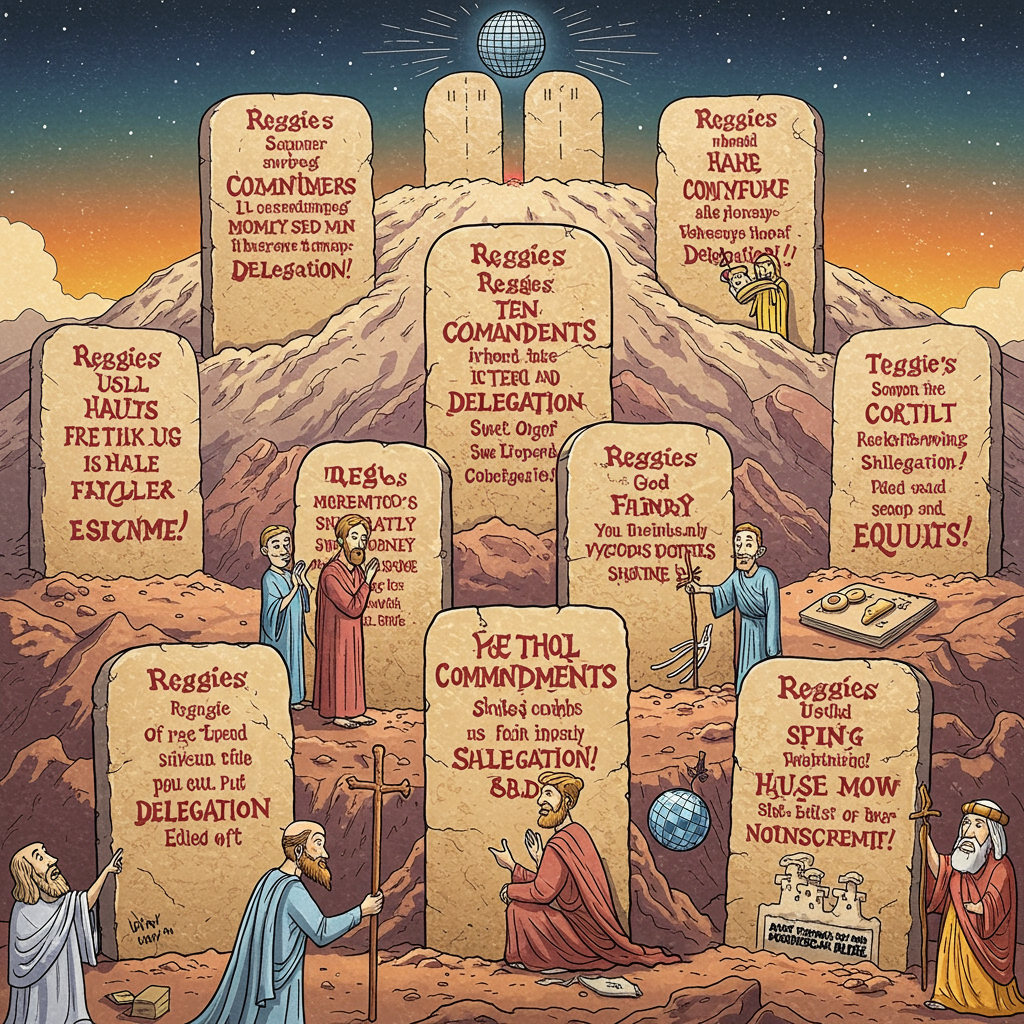
The Ten Commandments of Delegation

Foolproof Guide (Maybe)
Chapter 16: Reflections on Mediocrity: Or, Why I'm Perfectly Content Being Average (ish)
Right then, let's delve into a topic that is, shall we say, rather… personal. A topic that strikes at the very heart of this literary endeavor, and indeed, at the very core of my… ahem… philosophy. I speak, of course, of mediocrity.
Now, I can practically hear the collective gasp of horror from those of you clinging to the outdated notion that one must strive for excellence, that one must relentlessly pursue perfection, that one must… shudder… actually work hard. To those misguided souls, I offer a simple, yet profound, rejoinder: why bother?
Mediocrity, my dear reader, is not a vice. It is not a character flaw. It is, in fact, a strategic advantage. It is the secret sauce, the hidden ingredient, the… well, you get the idea. It's good.
Let me elaborate, shall I? For years, I have observed the frenetic activity of those around me, the relentless pursuit of "success," the constant striving for "achievement." And what have I seen? Stress. Anxiety. Premature balding. And, most importantly, a distinct lack of time for leisure pursuits.
I, on the other hand, have embraced mediocrity with open arms. I have cultivated a lifestyle of effortless ease, of strategic delegation, and of calculated… disinterest. And what have I achieved? Peace of mind. A healthy head of hair (thanks to my Swiss dermatologist, Dr. von Strudel), and an abundance of time for golf, cocktails, and the occasional polo match.
The key, you see, is to understand the difference between actual mediocrity and perceived mediocrity. One must cultivate an air of nonchalance, a subtle suggestion that one is capable of far greater things, but simply chooses not to exert oneself. It’s the art of the subtle brag, the understated boast, the… well, you get the idea.
Brenda, for instance, often accuses me of being a "lazy so-and-so" (I’ll spare you her more colorful language). But is she correct? Am I truly lazy? Or am I simply… strategically conserving my energy for more important endeavors? Endeavors such as… strategizing about future golfing opportunities.
Abernathy, bless his earnest heart, is a firm believer in the power of hard work. He arrives at the office at the crack of dawn, pores over spreadsheets until his eyes glaze over, and generally exhausts himself in the pursuit of… what, exactly? A slightly larger bonus? A pat on the back from a middle manager? I find the whole spectacle rather… quaint.
I once attempted to explain my philosophy to him, during a particularly tedious client meeting. I leaned over and whispered, "Abernathy, my boy, why work hard when you can work smart?"
He looked at me, utterly bewildered. "But sir," he stammered, "isn't working hard the smart thing to do?"
I sighed inwardly. Some lessons, it seems, cannot be taught. They must be… absorbed through osmosis, perhaps. Or, more likely, through a series of painful experiences that gradually erode one's naive belief in the power of meritocracy.
The truth, my dear reader, is that most people are perfectly content with mediocrity. They may not admit it, of course. They may even actively deny it. But deep down, they yearn for a life of effortless ease, of minimal responsibility, and of maximum… well, you get the idea.
And who am I to deny them that? I am, after all, a benevolent leader, a compassionate mentor, a… strategic delegator. I provide them with the opportunity to fulfill their desires, to embrace their inner mediocrity, to… well, to do my work for me.
Monty, of course, understands this implicitly. He's been coasting on inherited wealth and social connections for decades. He sees my approach not as laziness, but as… efficiency. "Reggie," he often says, while puffing on an expensive cigar, "you're a genius. You've cracked the code. You've figured out how to get paid for doing absolutely nothing."
And he's right, of course. I have. But it's not as simple as it sounds. It requires a certain… finesse. A certain… je ne sais quoi. It requires a masterful understanding of human psychology, a keen eye for talent, and a complete lack of moral scruples. Or, perhaps, simply a different set of moral scruples. One that prioritizes personal comfort and strategic advantage over… well, you get the idea.
The point, my dear reader, is this: embrace your mediocrity. Don't fight it. Don't resist it. Let it flow through you, like a fine wine. Let it guide you, like a well-paid caddy. Let it… well, you get the idea.
After all, in a world obsessed with achievement and perfection, mediocrity is a revolutionary act. It is a rebellion against the tyranny of hard work. It is a celebration of effortless ease. It is… well, it’s my life. And, frankly, I rather enjoy it.
But, perhaps, I’m being too harsh. Perhaps I'm not perfectly content with being average. Perhaps there's a tiny, almost imperceptible, part of me that yearns for… something more. Something… meaningful.
Nonsense. I need another martini.
And, speaking of martinis, I seem to recall delegating the task of stocking the bar to Abernathy. I should probably check on his progress. One can never be too careful when it comes to the proper preparation of a gin martini. Especially when one is relying on it to maintain one's… well, strategic mediocrity.
Besides, I have a sneaking suspicion that Abernathy has been secretly reading self-help books. I need to nip that in the bud before he starts developing delusions of grandeur. A good intern is a mediocre intern. And a mediocre intern is a happy intern. Or, at least, a pliable intern.
But, as I ponder the existential implications of my own average-ness (ish), I find myself wondering if perhaps I'm missing something. Perhaps there's a level of satisfaction to be found in actual, genuine achievement that I've been too cynical to consider. Perhaps…
No. No, that’s absurd. That’s… Abernathy thinking.
I shall continue, therefore, on my path of least resistance, delegating my way to the top, one expertly crafted cocktail at a time. After all, someone has to maintain the standards of mediocrity. It’s a tough job, but someone has to do it. And, frankly, I'm rather good at it.
So, join me next time, dear reader, as we explore the delicate art of managing upwards. Or, more accurately, the art of manipulating those above you into believing that you are actually contributing something of value. It's a tricky maneuver, but with the right combination of charm, cunning, and strategic inebriation, it can be surprisingly effective. Until then, I suggest you pour yourself a drink and contemplate the profound beauty of being perfectly… average.
And, Abernathy, if you’re reading this, make sure my martini is extra dry. And perhaps add a few more olives. After all, one must maintain appearances. Even when one is embracing mediocrity.
(End of Chapter 16)
Hook to the next chapter:
But what’s this? A memo on my desk, from… Abernathy? End "Project Phoenix: A Proposal for Radical Corporate Transformation"? Good heavens. This could be… problematic. I need a drink. And perhaps a very large, very strong cup of coffee. This calls for… intervention.

Reflections on Mediocrity

Perfectly Content (ish)
Dumb, Drunk, and Delegating: A Case Study in Mediocrity with Good Networking
1. Synopsis (275 words)
Reginald Bartholomew Finch III, a product of old money and an even older boys' club, presents a cynical, yet strangely compelling, analysis of success in the modern corporate landscape. "Dumb, Drunk, and Delegating" isn't your typical self-help manual; instead, it's a darkly humorous exploration of how mediocrity, when coupled with strategic inebriation and masterful delegation, can lead to surprisingly lofty positions. Reggie, a man who readily admits (though perhaps not explicitly) to coasting through life on inherited privilege and a Rolodex thicker than his resume, dissects the mechanics of corporate climbing with a detached, almost anthropological eye.
The book argues, with a wink and a stiff drink, that brilliance is overrated. True success, according to Reggie, lies in identifying talent, exploiting it (ethically, of course… mostly), and taking credit for the results. He champions the art of delegating, not as a mere management technique, but as a lifestyle. He delves into the importance of cultivating a network of capable individuals, often found in the most unexpected places (and frequently over a bottle of something expensive).
"Dumb, Drunk, and Delegating" isn't afraid to poke fun at the absurdity of corporate culture, the cult of personality, and the often-questionable decisions made by those in power. It offers a contrarian perspective on leadership, arguing that sometimes the best leader is the one who knows their limitations and surrounds themselves with people who don't share them. The book culminates in Reggie's "Ten Commandments of Delegation," a tongue-in-cheek guide to achieving success without breaking a sweat (or necessarily knowing what you're doing). This book appeals to readers who are tired of the saccharine platitudes of traditional business advice and are looking for a dose of cynical realism, served with a side of dry wit and a generous pour of scotch.
2. Chapter Breakdown (16 Chapters)
Chapter 1: The Accidental Executive: Or, How I Stumbled My Way to the Top (Again)
Reggie introduces himself and establishes his credentials (or lack thereof) with a self-deprecating anecdote about a boardroom blunder that somehow resulted in a promotion. He sets the stage for his unconventional approach to success, emphasizing the role of luck and good connections.
Chapter 2: The Myth of Meritocracy: Why Hard Work is for Suckers (and Interns)
Reggie dismantles the notion of meritocracy, arguing that success is often determined by factors other than talent and hard work. He introduces the concept of "inherited advantage" and its impact on career trajectories.
Chapter 3: Liquid Courage: The Art of Networking Over Cocktails (and Avoiding Awkward Conversations)
A guide to effective networking, with a focus on the social lubricant of alcohol. Reggie shares tips on how to navigate cocktail parties, cultivate relationships, and subtly extract valuable information. He includes anecdotes about disastrous networking attempts and the importance of knowing your limit (or not).
Chapter 4: Delegation: The Ultimate Productivity Hack (for Lazy Geniuses)
Reggie presents his core philosophy: delegation is not just a management technique, it's a lifestyle. He outlines the benefits of delegating tasks to others, emphasizing the importance of finding competent individuals and trusting them to get the job done (while taking the credit, of course).
Chapter 5: Identifying the Talent Pool: Where to Find Smart People (Who Will Do Your Work)
A practical guide to identifying and recruiting talented individuals. Reggie shares tips on how to spot potential, assess skills, and incentivize employees to perform at their best. He also discusses the importance of creating a supportive (and slightly exploitative) work environment.
Chapter 6: The Art of the Subtle Edict: How to Give Orders Without Sounding Like a Jerk
Reggie explores the nuances of effective communication, focusing on how to give instructions in a way that is both clear and non-offensive. He emphasizes the importance of tone, body language, and the strategic use of passive-aggressive language.
Chapter 7: Blame Game 101: Mastering the Art of Deflecting Responsibility
A cynical look at accountability in the workplace. Reggie shares tips on how to avoid blame when things go wrong, emphasizing the importance of plausible deniability and having a designated scapegoat. He cautions against taking credit for successes when failure is a possibility.
Chapter 8: The Power of the Pause: Or, How to Look Intelligent While Saying Absolutely Nothing
Reggie delves into the art of strategic silence, arguing that sometimes the best response is no response at all. He shares techniques for appearing thoughtful and knowledgeable, even when you have no idea what's going on.
Chapter 9: The Corporate Uniform: Dressing for Success (Without Actually Trying)
A guide to navigating the unspoken rules of corporate attire. Reggie offers advice on how to dress appropriately for different occasions, emphasizing the importance of subtle cues and understated elegance.
Chapter 10: The Office Politician: Navigating the Treacherous Waters of Workplace Drama
Reggie explores the complexities of office politics, offering insights into the motivations and strategies of different players. He shares tips on how to avoid conflict, build alliances, and maneuver your way to the top.
Chapter 11: The Importance of Golf: Or, How I Learned to Stop Worrying and Love the Fairway
A tongue-in-cheek exploration of the social significance of golf in the business world. Reggie argues that golf is not just a sport, it's a networking opportunity, a power play, and a test of character (or lack thereof).
Chapter 12: The Illusion of Control: Why Micromanaging is for Amateurs (and Control Freaks)
Reggie argues against micromanagement, emphasizing the importance of trusting your team and giving them the autonomy to do their jobs. He warns against the dangers of getting bogged down in the details and losing sight of the bigger picture.
Chapter 13: The Art of the Apology: Saying "Sorry" Without Actually Meaning It
Reggie explores the delicate art of apologizing, focusing on how to convey remorse without admitting fault. He shares techniques for crafting effective apologies that will appease your critics and protect your reputation.
Chapter 14: The Future of Work: Or, Why Robots Will Eventually Replace Us All (and I'll Be on a Yacht)
Reggie offers his predictions for the future of work, arguing that automation will eventually render most jobs obsolete. He explores the implications of this trend for society and offers advice on how to prepare for the coming robot apocalypse (mostly by investing in yachts).
Chapter 15: The Ten Commandments of Delegation: A Foolproof Guide to Success (Maybe)
Reggie presents his definitive guide to delegation, outlining ten key principles for achieving success without breaking a sweat. These "commandments" are presented with a healthy dose of irony and self-deprecation.
Chapter 16: Reflections on Mediocrity: Or, Why I'm Perfectly Content Being Average (ish)
Reggie concludes the book with a final reflection on his own life and career, embracing his mediocrity and celebrating the power of good networking. He offers a surprisingly sincere message about the importance of self-acceptance and finding happiness in your own way (even if that way involves a lot of scotch and delegated tasks).
3. Themes and Motifs
The Illusion of Meritocracy: The book constantly questions the idea that success is solely based on hard work and talent, highlighting the role of privilege, connections, and luck. The Power of Delegation: Delegation is presented as more than just a management strategy; it's a way of life, a means of achieving success without actually doing much work. Corporate Cynicism: The book adopts a cynical and satirical tone, poking fun at the absurdities and hypocrisies of the corporate world. The Importance of Networking: Building and maintaining a strong network is portrayed as crucial for success, often more important than actual skills or knowledge. Embracing Mediocrity: The book subtly suggests that it's okay to be average, as long as you're good at delegating and networking.
4. Narrative Structure
Point of View: First-person, from the perspective of Reginald Bartholomew Finch III. This allows for a biased, humorous, and self-deprecating narrative voice. Timeline: Linear, with occasional flashbacks to illustrate specific points or anecdotes. Unique Structural Elements: The book is presented as a series of observations and reflections, rather than a traditional narrative with a clear plot. The "Ten Commandments of Delegation" serve as a central organizing principle, tying together the various themes and ideas. ```
Character Profiles: "Dumb, Drunk, and Delegating"
As penned by Reginald Bartholomew Finch III (a.k.a. "Your Guide to Corporate Ascendancy Through Calculated Inebriation and Strategic Delegation")
1. Bartholomew "Bart" Abernathy - The Eager Intern (Scapegoat in Training)
-
Role in the Story: Bart is the quintessential bright-eyed, bushy-tailed intern, brimming with naive enthusiasm and an unwavering belief in the power of hard work. He serves as Reggie's primary target for delegation, a blank slate upon which Reggie can project his own (lack of) ambition. Bart is also the designated scapegoat, should any of Reggie's schemes go awry.
-
Physical Description: Bart is a lanky young man, barely out of his teens, with a perpetually surprised expression. He favors ill-fitting suits purchased from discount retailers and a tie that clashes horribly with his shirt. His posture is perpetually hunched, a testament to long hours spent hunched over a computer screen. He has a nervous habit of adjusting his glasses, which are perpetually sliding down his nose.
-
Personality Traits: Bart is earnest, diligent, and utterly lacking in cynicism. He is eager to please, always willing to go the extra mile, and genuinely believes that hard work will be rewarded. He is also incredibly naive, blind to the political machinations of the corporate world and utterly trusting of authority figures (a fatal flaw in Reggie's world).
-
Background/History: Bart is a scholarship student from a working-class background, determined to prove himself in the cutthroat world of corporate finance. He sees his internship with Reggie as a golden opportunity to gain valuable experience and to network with influential individuals. He is the first in his family to attend college and feels immense pressure to succeed.
-
Motivations and Goals: Bart's primary motivation is to secure a full-time position with the company and to make his family proud. He is also driven by a genuine desire to learn and to contribute to the success of the organization (a quaint notion, in Reggie's opinion).
-
Key Relationships:
- Reggie: A mentor figure (in Bart's naive perception), but in reality, Reggie sees Bart as a useful tool and a potential liability.
- Brenda (see below): Bart develops a tentative friendship with Brenda, who serves as his confidante and occasional source of advice (though Bart often fails to heed her warnings).
-
Character Arc/Development: Bart's character arc is a slow descent into disillusionment. He begins the story full of hope and optimism, but gradually becomes jaded and cynical as he witnesses the true nature of corporate life. By the end of the book, he has learned the value of self-preservation and the importance of networking (though he still struggles with the art of delegation).
-
Strengths: Diligence, enthusiasm, a strong work ethic.
- Weaknesses: Naiveté, lack of cynicism, inability to recognize manipulation.
- Unique Quirks/Habits: Constantly adjusting his glasses, using overly formal language, carrying a well-worn copy of "How to Win Friends and Influence People."
2. Brenda McMillan - The World-Weary Executive Assistant (Reggie's Unofficial Babysitter)
-
Role in the Story: Brenda is Reggie's long-suffering executive assistant, a woman who has seen it all and is no longer surprised by anything. She serves as Reggie's conscience (though he rarely listens), his gatekeeper, and his unofficial babysitter. She is the only person who dares to speak frankly to Reggie, often delivering her criticisms with a withering stare and a dry wit.
-
Physical Description: Brenda is a woman in her late 40s, with a no-nonsense demeanor and a wardrobe that favors practical, yet stylish, business attire. She has a sharp gaze and a perpetually skeptical expression. She often wears a scarf, which she uses to subtly express her disapproval of Reggie's behavior.
-
Personality Traits: Brenda is intelligent, resourceful, and fiercely independent. She is cynical and world-weary, but also possesses a deep sense of loyalty and a surprising capacity for compassion. She is fiercely protective of her colleagues (especially Bart) and has a low tolerance for incompetence and arrogance.
-
Background/History: Brenda has worked for the company for over 20 years, witnessing countless executives come and go. She has a vast knowledge of the company's history, its internal politics, and its hidden scandals. She is a single mother, raising two children on her own, and has learned to be tough and resilient in the face of adversity.
-
Motivations and Goals: Brenda's primary motivation is to provide for her family and to maintain her own sense of integrity in a corrupt corporate environment. She also secretly hopes to mentor Bart and to guide him away from the pitfalls of corporate cynicism.
-
Key Relationships:
- Reggie: A complex relationship of mutual dependence and exasperation. Brenda respects Reggie's intelligence (however misguided) and recognizes his potential, but is constantly frustrated by his laziness and lack of accountability.
- Bart: A maternal figure to Bart, offering him advice and support (often behind Reggie's back).
-
Character Arc/Development: Brenda's character arc is subtle but significant. Throughout the book, she gradually develops a grudging respect for Reggie, recognizing that his unconventional methods, however flawed, sometimes yield unexpected results. She also becomes more vocal in her criticisms, challenging Reggie's behavior and pushing him to be a better (or at least less terrible) leader.
-
Strengths: Intelligence, resourcefulness, loyalty, a strong moral compass.
- Weaknesses: Cynicism, a tendency to be overly critical, a reluctance to take risks.
- Unique Quirks/Habits: Adjusting her scarf to express disapproval, making sarcastic comments under her breath, secretly organizing office pools on Reggie's latest blunders.
3. Montgomery "Monty" Sterling - The Old Boys' Club Benefactor (Reggie's Drinking Buddy and Golfing Partner)
-
Role in the Story: Monty represents the establishment, the old guard, the embodiment of inherited privilege and unwavering loyalty to the status quo. He's Reggie's golfing buddy, his drinking partner, and his key connection to the upper echelons of corporate power.
-
Physical Description: Monty is a portly man in his late 60s, with a ruddy complexion and a perpetually jovial expression. He favors expensive, but ill-fitting, suits and a collection of garish ties. He has a booming voice and a hearty laugh that can be heard throughout the office. He always carries a humidor filled with expensive cigars.
-
Personality Traits: Monty is gregarious, charming, and utterly devoid of self-awareness. He is a firm believer in the old boys' club and is fiercely loyal to his friends (especially those who can improve his golf game). He is also incredibly naive and easily manipulated, often falling victim to Reggie's schemes.
-
Background/History: Monty is a scion of a wealthy and influential family, who has spent his entire career coasting on his connections and his ability to charm his way through any situation. He is a graduate of the same Ivy League university as Reggie (though his academic performance was even worse) and has been a member of the same exclusive golf club for over 40 years.
-
Motivations and Goals: Monty's primary motivation is to maintain his position of power and influence and to enjoy the privileges that come with it. He is also driven by a desire to preserve the traditions of the old boys' club and to ensure that the next generation of leaders is equally privileged and unqualified.
-
Key Relationships:
- Reggie: A close friend and confidante, though Monty is largely unaware of Reggie's true motivations.
- The Board of Directors: Monty is a key member of the board and wields considerable influence within the company.
-
Character Arc/Development: Monty's character arc is minimal. He remains largely unchanged throughout the book, a symbol of the entrenched power structures that Reggie is both benefiting from and satirizing.
-
Strengths: Connections, influence, unwavering loyalty (to his friends).
- Weaknesses: Naiveté, lack of self-awareness, susceptibility to manipulation.
- Unique Quirks/Habits: Telling the same tired jokes, constantly bragging about his golf game, referring to everyone as "old boy."
These character profiles, I trust, Mr. Finch, will provide a solid foundation for your... unique narrative. Remember, the key to success is delegation. Now, if you'll excuse me, I have a tee time to keep. And perhaps a martini or three. After all, liquid courage is essential for strategic networking, wouldn't you agree?
World-Building for "Dumb, Drunk, and Delegating" (As envisioned by Reginald Bartholomew Finch III)
1. Setting/Location Details
General Overview: The book operates primarily within the sterile, yet lavish, environments of modern corporate offices and exclusive social clubs. Reggie's world is largely confined to the upper echelons of society, a bubble of privilege and detachment from the 'real world.' Geographic specificity is deemphasized; the locations are archetypal rather than rooted in reality, serving as backdrops for the social and economic interactions of the elite.
- Climate: The climate is always temperate, predictable, and controlled. Think climate-controlled offices, perfectly manicured golf courses, and precisely heated (but never hot) swimming pools. Any deviation from this ideal is considered a minor inconvenience, easily rectified by the appropriate application of wealth.
- Architecture: Architecture is of the "Bland-But-Expensive" variety. Modern skyscrapers with floor-to-ceiling windows offering impressive (but ultimately meaningless) views. Interior design favors minimalist aesthetics with strategically placed pieces of "art" that serve more as status symbols than genuine artistic expressions. Think marble lobbies, oak-paneled boardrooms, and private dining rooms with impeccable lighting. Historical architecture exists solely as a backdrop for exclusive events or as a repository for family heirlooms. Old money loves old buildings, but only if they've been impeccably modernized.
- Geography: Geography is largely irrelevant. The world is flattened by the ease of international travel and the homogenization of globalized culture. The important geographical features are airports (preferably private), golf courses (the more exclusive, the better), and the locations of various branch offices (for strategic delegation purposes, of course).
2. Time Period and Historical Context
Time Period: Vaguely "modern," somewhere between the late 20th and early 21st centuries. Specific dates are unimportant; the historical context is defined by the rise of globalization, the dominance of corporate culture, and the widening gap between the rich and the poor.
- Historical Context: History, as Reggie sees it, is a series of financial transactions and strategic alliances. He views the past as a source of family legacy and inherited advantage, rather than a source of genuine learning or reflection. Key historical events are seen through the lens of their impact on the family fortune. The industrial revolution? A golden opportunity for shrewd land deals. The Great Depression? A temporary setback that weeded out the weak. World War II? An unfortunate distraction from the more important business of making money. The rise of the internet? A disruptive technology that ultimately serves to reinforce existing power structures.
3. Social Structures and Hierarchies
Social Structures: The social structure is rigidly hierarchical, based primarily on wealth, family lineage, and social connections. There's the "Old Money" elite (Reggie's crowd), the "New Money" upstarts (to be tolerated, but never fully trusted), the "Professional Class" (the competent individuals who actually do the work), and the "Service Class" (largely invisible, except when needed).
- Hierarchies:
- The Finches and Their Kind: At the top of the pyramid sits the old money elite, families like the Finches, who have accumulated wealth over generations. They wield considerable influence behind the scenes, controlling vast sums of capital and shaping the political landscape to their advantage. They maintain their position through exclusive social clubs, private schools, and strategic marriages.
- The "Self-Made" Millionaires (and Billionaires): One rung below are the "self-made" millionaires and billionaires, the tech entrepreneurs, hedge fund managers, and real estate developers who have amassed fortunes through innovation, risk-taking, or sheer luck. They are often viewed with suspicion by the old money elite, who see them as lacking the refinement and social graces necessary to truly belong. However, their wealth is undeniable, and they are gradually integrated into the upper echelons of society through strategic partnerships and philanthropic endeavors.
- The Upper Management Class: Below them are the upper management class, the CEOs, CFOs, and other high-ranking executives who run the corporations that generate the wealth. They are highly educated and skilled, but ultimately subservient to the interests of the owners and shareholders. They enjoy comfortable salaries and lavish perks, but their positions are precarious, subject to the whims of the market and the shifting tides of corporate politics.
- The Middle Management Class: Further down the ladder is the middle management class, the project managers, team leaders, and department heads who oversee the day-to-day operations of the corporations. They are the backbone of the economy, working long hours and bearing the brunt of the pressure from above. They aspire to climb the corporate ladder, but many are stuck in dead-end jobs, facing the prospect of a lifetime of quiet desperation.
- The Working Class: At the bottom of the pyramid is the working class, the factory workers, retail employees, and service providers who perform the essential labor that keeps the economy running. They earn meager wages and face constant job insecurity. They are largely ignored by the upper classes, except when their labor is needed.
- The Invisible Class: The 'help.' The groundskeepers, the housekeepers, the drivers, the assistants. Essential, but rarely acknowledged.
4. Political Systems and Power Dynamics
Political Systems: Politics is viewed as a game played by the elite to maintain their power and influence. Democracy is a convenient fiction, a way to appease the masses while ensuring that the "right" people remain in control. Lobbying, campaign contributions, and strategic alliances are the true levers of power.
- Power Dynamics: Power is concentrated in the hands of the wealthy and well-connected. The political system is designed to protect their interests, with laws and regulations that favor corporations and the wealthy elite. Politicians are often beholden to special interests, prioritizing their own financial gain over the needs of the public. Public opinion is easily manipulated through propaganda and misinformation, ensuring that the masses remain docile and compliant.
- The Illusion of Choice: The political system presents a facade of choice, with two or more parties vying for power. However, both parties are ultimately controlled by the same wealthy interests, ensuring that the fundamental power structures remain unchanged. Voters are given the illusion of participation, but their choices are limited to candidates who have been pre-selected by the elite.
5. Economic Systems
Economic Systems: Capitalism, but with a heavy emphasis on inherited wealth and insider trading (discreetly, of course). The market is rigged in favor of the wealthy, with loopholes and tax breaks that allow them to accumulate even more wealth while avoiding their fair share of taxes.
- The Gospel of Growth: The economic system is driven by the relentless pursuit of growth, with corporations constantly seeking to expand their profits and market share. This pursuit of growth often comes at the expense of the environment, the well-being of workers, and the stability of the economy.
- The Cult of Consumption: The economic system is fueled by consumerism, with individuals encouraged to spend their money on unnecessary goods and services. Advertising and marketing techniques are used to create artificial needs and desires, driving people to accumulate debt and live beyond their means.
- The Inequality Machine: The economic system is inherently unequal, with the wealthy accumulating ever-greater fortunes while the poor struggle to survive. This inequality is justified by the myth of meritocracy, the belief that success is solely determined by hard work and talent. However, the reality is that wealth and privilege are often inherited, creating a self-perpetuating cycle of inequality.
6. Cultural Elements
Cultural Elements: Culture is defined by conspicuous consumption, superficial displays of wealth, and a deep-seated cynicism. Art is a commodity, music is background noise, and literature is something to be name-dropped at cocktail parties.
- Customs and Traditions:
- The Annual Yacht Race: A prestigious event where wealthy individuals compete for bragging rights and social status. The race is less about sailing skill and more about the size and opulence of the yachts.
- The Charity Gala: A lavish affair where the elite gather to donate to worthy causes (mostly for the tax write-off and the photo opportunities). The galas are often more about networking and social climbing than genuine philanthropy.
- The Summer Retreat: A tradition where wealthy families escape the city for the summer, retreating to their sprawling estates in the countryside or their luxurious villas on the coast. The retreats are a time for relaxation, recreation, and maintaining social connections.
- Beliefs: The dominant belief is that wealth equals worth. Success is measured solely by financial gain, and those who fail to accumulate wealth are deemed to be failures. There is a deep-seated belief in the superiority of the wealthy elite, who see themselves as the natural leaders of society.
7. Technology or Magic Systems
Technology: Technology is embraced, but primarily as a tool for efficiency and convenience. The latest gadgets are status symbols, and innovation is valued only insofar as it increases profits or streamlines delegation. The darker aspects of technology (privacy concerns, job displacement) are conveniently ignored. No magic here, just good old-fashioned financial wizardry and technological advancement.
- The Algorithmic Overlords: Algorithms play an increasing role in decision-making, with corporations relying on data analytics to optimize their operations and maximize their profits. However, these algorithms are often biased and opaque, perpetuating existing inequalities and creating new forms of discrimination.
- The Surveillance State: Technology is used to monitor and control the population, with governments and corporations collecting vast amounts of data on individuals' activities and behaviors. This data is used to predict and influence people's choices, eroding their privacy and autonomy.
- The Virtual Reality Escape: Technology offers an escape from the harsh realities of the world, with virtual reality and other immersive technologies providing a refuge from the drudgery of work and the anxieties of modern life. However, this escape is often addictive and isolating, leading to a disconnection from the real world and a loss of genuine human connection.
8. Important Locations and Their Significance
- The Boardroom: The epicenter of power, where decisions are made that shape the lives of millions. It's a place of carefully orchestrated meetings, strategic alliances, and subtle power plays.
- The Golf Course: A social arena where business deals are brokered and relationships are forged. It's a place of casual conversation, strategic maneuvering, and unspoken rules.
- The Exclusive Club: A haven for the elite, a place where they can relax and socialize with like-minded individuals. It's a place of privilege, exclusivity, and unspoken understanding.
- The Private Jet: A symbol of wealth and freedom, allowing the elite to travel the world in comfort and style. It's a place of luxury, convenience, and detachment from the masses.
- The Yacht: See "Private Jet" but on the water.
9. History and Mythology of the World
History and Mythology: The mythology is built around the "self-made" man (or woman), the Horatio Alger story of rags to riches. In reality, these stories are often exaggerated or outright fabrications, obscuring the role of privilege and luck in achieving success. The history is written by the winners, who conveniently omit the inconvenient truths about their rise to power.
- The Founding Fathers of Capitalism: The historical figures who are revered are the great industrialists, the entrepreneurs who built empires and amassed fortunes. Their stories are often romanticized, glossing over the exploitation and environmental damage that accompanied their success.
- The Myths of Innovation: The myths of innovation celebrate the disruptive technologies that have transformed the world. However, these myths often ignore the social and economic consequences of these technologies, such as job displacement and increased inequality.
- The Legends of Philanthropy: The legends of philanthropy celebrate the wealthy individuals who donate to worthy causes. However, these donations are often used to burnish their reputations and to gain political influence, rather than to genuinely address the root causes of social problems.
10. Rules or Laws that Govern the World
Rules and Laws: The laws are selectively enforced, with the wealthy and powerful often able to evade accountability for their actions. The rules are designed to protect the interests of the elite, ensuring that they maintain their power and privilege.
- The Unwritten Rules of Etiquette: The unwritten rules of etiquette govern social interactions, dictating how individuals should behave in different settings. These rules are often subtle and nuanced, requiring a deep understanding of social cues and unspoken expectations.
- The Laws of Supply and Demand: The laws of supply and demand are seen as immutable forces that determine the prices of goods and services. However, these laws are often manipulated by corporations and governments, who use their power to influence markets and control prices.
- The Golden Rule (for the Wealthy): "He who has the gold makes the rules."
This world-building framework, crafted in the voice of Reginald Bartholomew Finch III, provides a foundation for the book "Dumb, Drunk, and Delegating." It emphasizes the themes of privilege, power, and cynicism that are central to Reggie's worldview, creating a satirical and unsettling portrait of the modern corporate landscape.
Alright, let's see if we can't whip up some marketing materials for this… unique endeavor. I'll channel my inner Reggie Finch and inject a healthy dose of cynicism, privilege, and questionable advice into these promotional materials. After all, that's what the readers are paying for, isn't it?
Marketing Materials for "Dumb, Drunk, and Delegating: A Case Study in Mediocrity with Good Networking"
1. BOOK BLURB (150-200 words)
Tired of saccharine self-help gurus peddling the myth of meritocracy? Prepare for a bracing shot of reality with Reginald Bartholomew Finch III's "Dumb, Drunk, and Delegating." This isn't your typical guide to corporate success; it's a darkly humorous exposé on how mediocrity, strategically lubricated with fine spirits and expertly delegated, can catapult you to the top.
Reggie, a product of old money and even older boys' clubs, dissects the art of corporate climbing with a detached, almost anthropological eye. Discover the secrets to identifying talent (and exploiting it, ethically, of course), mastering the subtle art of the subtle edict, and cultivating a network of capable individuals – all while maintaining a respectable BAC.
Forget those tiresome tales of hard work and dedication. Reggie reveals the truth: success isn't about what you know, but who you know… and how much they're willing to do for you. Are you ready to embrace the power of delegation and finally achieve the corner office you deserve? Or will you remain a cog in the machine, toiling away while the truly mediocre reap the rewards? The answer, my friend, is in the bottle… and the Rolodex.
2. TAGLINE (1-2 sentences)
- Success isn't about brilliance, it's about delegation. And maybe a well-placed martini.
- Climb the corporate ladder without breaking a sweat (or knowing what you're doing).
3. AUTHOR BIO (100-150 words)
Reginald Bartholomew Finch III is a seasoned veteran of the corporate world, a product of old money, and a connoisseur of fine spirits. He holds a degree in Business Administration from a prestigious Ivy League university (though the details are best left unexamined). Reggie has spent his career navigating the treacherous waters of corporate politics, mastering the art of delegation, and cultivating a network of influential contacts.
He has no previous writing experience (why bother when you can pay someone else to do it?), but his unique perspective and unflinching honesty make him a refreshing voice in the often-stale world of business literature. "Dumb, Drunk, and Delegating" is not just a book; it's a lifestyle. A testament to the power of mediocrity, strategic inebriation, and the art of getting others to do your work.
4. KEY SELLING POINTS (5-7 bullet points)
- A Cynical Take on Corporate Success: This isn't your typical feel-good business book; it's a brutally honest (and darkly humorous) look at how mediocrity can thrive in the corporate world.
- Practical Advice (of a Sort): Reggie offers actionable (though ethically questionable) strategies for navigating corporate politics, mastering the art of delegation, and climbing the ladder without breaking a sweat.
- Target Audience: Anyone who's tired of the corporate grind, disillusioned with the myth of meritocracy, and looking for a way to get ahead without actually working hard.
- Timely Themes: Explores the themes of privilege, power, and the absurdity of corporate culture in a way that resonates with today's cynical and skeptical audience.
- The Anti-Self-Help Book: A refreshing alternative to the saccharine platitudes of traditional self-help books, offering a dose of cynical realism and dry wit.
- Perfect for the Disenchanted: Offers a knowing wink and a shared laugh to those who feel like they're surrounded by incompetence and rewarded for mediocrity.
- Networking Tips (with a Twist): Learn how to leverage social connections and cultivate relationships over cocktails (and avoid awkward conversations).
5. COMPARABLE S (3-5 books)
- "The 4-Hour Workweek" by Timothy Ferriss: Similar in its promise of efficiency and lifestyle optimization, but "Dumb, Drunk, and Delegating" offers a more realistic (and less idealistic) approach to achieving work-life balance (mostly by shifting the "work" part onto someone else).
- "Dilbert" by Scott Adams: Shares a similar satirical take on the absurdities of corporate life, but "Dumb, Drunk, and Delegating" goes beyond mere observation to offer a (highly questionable) blueprint for navigating the system.
- "The Peter Principle" by Laurence J. Peter and Raymond Hull: Explores the concept of incompetence rising to the level of management, but "Dumb, Drunk, and Delegating" takes it a step further, offering a guide to actively cultivating and benefiting from that incompetence.
- "Barbarians at the Gate" by Bryan Burrough and John Helyar: While focusing on high finance, shares a similar theme of unchecked ambition and questionable ethics, but "Dumb, Drunk, and Delegating" offers a more personal and humorous perspective on the inner workings of corporate power.
- "Liar's Poker" by Michael Lewis: Offers a glimpse into the cutthroat world of Wall Street, but "Dumb, Drunk, and Delegating" provides a more accessible (and less financially focused) look at the art of manipulation and self-preservation in the workplace.
6. SOCIAL MEDIA CONTENT IDEAS (5-7 ideas)
- "Reggie's Rules for Corporate Survival": Share snippets of Reggie's unconventional advice, such as "Always delegate upwards" or "Never apologize for being right (even when you're wrong)."
- "Ask Reggie Anything": Host a live Q&A session where readers can ask Reggie their burning questions about corporate life (prepare for sarcastic responses).
- "Corporate Bingo": Create a bingo card with common corporate buzzwords and phrases (e.g., "synergy," "think outside the box," "low-hanging fruit") and encourage readers to play along during their next meeting.
- "The Art of the Subtle Edict": Share examples of how to give orders without actually sounding like you're giving orders.
- "Reggie's Cocktail of the Week": Recommend a different cocktail each week, along with tips on how to network effectively while enjoying it.
- "Delegation Dos and Don'ts": Offer a humorous guide to delegating tasks effectively (and avoiding common pitfalls).
- "Caption This Corporate Photo": Post a funny or absurd photo of a corporate setting and ask readers to provide the best caption. Use a picture of a water cooler, office party, or the boss's parking spot.
There you have it. Enough marketing materials to get this… endeavor off the ground. Now, if you'll excuse me, I have a tee time to keep. And a martini to order. After all, strategic networking is essential for success, wouldn't you agree?

